Treasury Board President: Decisions and Actions during First 100 Days
Notice to readers
This document contains information which has been redacted in accordance with provisions of Part 1 of the Access to Information Act
| Theme | Issue |
|---|---|
| Tab 1: Expenditure and Supply | Supply Planning in Fall 2019 |
| Supply Planning in Winter 2020 | |
| Tab 2: Collective Bargaining | [redacted] |
| [redacted] | |
| 2020 Benefit Premium Rates | |
| Mandate for Public Service Health Care Plan Negotiations | |
| Tab 3: People Management | Next Generation Human Resources (HR) and Pay Initiative |
| National Joint Council Directives Cyclical Review | |
| Tab 4: Parliamentary Reporting | Tabling the Departmental Results Reports |
| Actuarial Report: Royal Canadian Mounted Police Pension Plan | |
| Report to Parliament on Regulatory Management Initiatives | |
| Treasury Board Secretariat Annual Report on the Administration of the Access to Information Act and Privacy Act | |
| Signing and Tabling of the 2019 Public Accounts of Canada | |
| Treasury Board Secretariat Departmental Results Report for the 2018 to 2019 fiscal year | |
| Audit Report on the Office of the Auditor General | |
| Public Servants Disclosure Protection Act Annual Report | |
| [redacted] | |
| President of the Treasury Board’s Fees Report for the 2018 to 2019 fiscal year | |
| Tab 5: Administrative and non-Parliamentary Reporting | [redacted] |
| Proactive Publication of Question Period Notes | |
| Annual Report on the Administration of the Access to Information Act and Privacy Act across Government | |
| Delegation of Financial Signing Authorities | |
| Delegation Instrument for the Access to Information Act and Privacy Act | |
| Governor in Council and Ministerial Appointments | |
| Tab 6: Legislation and Policy | Horizontal Fixed Asset Review |
| [redacted] | |
| Tab 7: Stakeholders and Partners | Stakeholders and Partners Cover Note |
| Chris Aylward, National President, Public Service Alliance of Canada | |
| Debi Daviau, President, Professional Institute of the Public Service of Canada | |
| Tab 8: President of the Treasury Board’s Portfolio Organizations | Portfolio Organizations Cover Note |
| Nancy Bélanger, Commissioner of Lobbying of Canada | |
| Joe Friday, Public Sector Integrity Commissioner | |
| Martin Glynn, Chair of the Board of Directors, Public Sector Pension Investment Board | |
| Taki Sarantakis, President, Canada School of Public Service | |
| Tab 9: Regulatory Stakeholders | Regulatory Stakeholders Cover Note |
| Hon. Perrin Beatty, President and Chief Executive Officer, Canadian Chamber of Commerce | |
| Laura Jones, Executive Vice-President and Chief Strategic Officer, Canadian Federation of Independent Business | |
| Goldy Hyder, President and Chief Executive Officer, Business Council of Canada | |
| Maryscott (Scotty) Greenwood, Chief Executive Officer, Canadian American Business Council | |
| Tab 10: Agents and Officers of Parliament | Agents and Officers of Parliament Cover Note |
| Sylvain Ricard, Interim Auditor General of Canada | |
| Daniel Therrien, Privacy Commissioner of Canada | |
| Raymond Théberge, Commissioner of Official Languages | |
| Caroline Maynard, Information Commissioner of Canada | |
| Yves Giroux, Parliamentary Budget Officer | |
| Mario Dion, Conflict of Interest Commissioner | |
| Tab 11: Provincial and Territorial Counterparts | Provincial and Territorial Counterparts Cover Note |
| Hon. Travis Toews, President of Treasury Board and Minister of Finance, Alberta | |
| Hon. Carole James, Minister of Finance and Deputy Premier and Chair of Treasury Board Committee, British Columbia | |
| Hon. Scott Fielding, Minister of Finance, Manitoba | |
| Hon. Ernie Steeves, Minister of Finance and President of Treasury Board, New Brunswick | |
| Hon. Tom Osborne, Minister of Finance and President of Treasury Board, Newfoundland and Labrador | |
| Hon. Karen Lynn Casey, Minister of Finance and Treasury Board, Nova Scotia | |
| Hon. Geoff MacLellan, Minister of Trade, Nova Scotia | |
| Hon. Peter Bethlenfalvy, President of the Treasury Board, Ontario | |
| Hon. Darlene Compton, Minister of Finance and Chairperson of Treasury Board, Prince Edward Island | |
| Hon. Christian Dubé, Minister of Government Administration and President of the Treasury Board, Québec | |
| Hon. Donna Harpauer, Minister of Finance, Saskatchewan | |
| Hon. George Hickes, Minister of Finance, Nunavut | |
| Hon. Sandy Silver, Minister of the Executive Council Office and Finance, Yukon | |
| Hon. Caroline Wawzonek – Minister of Finance and Minister of Justice, Northwest Territories | |
| Tab 12: International Counterparts | International Counterparts Cover Note |
| Russel Vought, Deputy Director of the Office of Management and Budget, United States | |
| The Right Hon. Rishi Sunak, Chief Secretary to the Treasury, United Kingdom | |
| Hon. Mathias Cormann, Minister of Finance, Australia | |
| Hon. Josh Frydenberg, Treasurer of the Commonwealth, Australia | |
| Hon. Grant Robertson, Minister of Finance and Responsible Minister for the Treasury, New Zealand | |
| H.E. Juan Andrés Roballo, Deputy Secretary of the Presidency, Uruguay (former Chair of the Digital Nine group of nations) |
-
Supply Planning in fall 2019
Issue
Direction is required on obtaining additional supply (appropriations) in fall 2019.
Required-by dates
By November 22, 2019: Confirmation by the President of the government’s direction on whether and how to obtain additional supply in fall 2019 for the current fiscal year ending on March 31, 2020.
Background and key developments
Through the business of supply, the government asks Parliament to appropriate, or authorize, the funds required to meet its financial obligations. These requests are in the form of supply bills (appropriation acts), supported by the Main and Supplementary Estimates.
[redacted] In a non-election year, these measures would be included in a Supplementary Estimates, to be tabled in the House of Commons by November. The related supply bill would be introduced in early December, with Parliamentary approval and Royal Assent before the winter break.
This year, when the new Cabinet is formed after the federal election, senior central agency officials will seek the views of the Prime Minister and Minister of Finance on the government’s immediate priorities and spending plans for the rest of the fiscal year, and the extent to which the current stock of approvals is consistent with the new fiscal direction.
At the same time, departments will seek their Ministers’ views on previously approved measures to identify essential payments that cannot be delayed or cash-managed until supply for the final Supplementary Estimates of the current fiscal year, which could be as late as March 31, 2020.
Based on these consultations, the Prime Minister will decide whether the government will proceed with a request for additional supply in fall 2019.
With the Leader of the Government in the House of Commons, the Prime Minister will also decide whether to obtain that additional supply through a directed Supplementary Estimates before the end of the supply period on December 10 or Governor General Special Warrants shortly before the 43rd Parliament opens on December 5.
The Treasury Board Secretariat will require the direction on fall supply to be conveyed by the President by late November 2019.
Considerations
The approach for fall supply will be influenced by:
- the nature and urgency of the government’s spending priorities for this fiscal year
- departments’ need for additional supply
[redacted]
Risks of deferral
Based on early indications from departments, fall supply will be required for the government to meet all its financial obligations before the next opportunity for supply, from the final Supplementary Estimates. Delays in supply may hinder departments from moving forward with announced initiatives.
Deadlines for tabling documents or introducing supply bills in the House of Commons are established in the Standing Orders of the House of Commons and the Financial Administration Act. Failure to respect these deadlines could be perceived as a breach of protocol or contempt of Parliament.
Office of primary interest
Glenn Purves
Assistant Secretary
Expenditure Management Sector
613-369-9568Annex: 2019 to 2020 fiscal year fall supply
All federal government spending must be authorized by Parliament, through an appropriation act or other legislation.
The government’s requests for appropriations are supported by the spending plans set out in the Estimates. They are typically tabled in the House of Commons by the end of the spring (May/June), fall (November/December) and winter (February/March) supply periods.
When Parliament has been dissolved for an election, section 30 of the Financial Administration Act allows the Governor General to issue special warrants. In requesting this authority, the portfolio Minister must attest that the payments supported by the special warrants are urgently required for the public good. The President of the Treasury Board must also confirm that there are no other appropriations from which to make the payments.
The Secretariat is working closely with other central agencies to brief the new government immediately post-election on spending priorities for the current fiscal year, which is one of the considerations in the decision on when to open the new Parliament.
There is also work with departments to monitor cash requirements. Early indications are that there are essential items requiring additional supply in the fall.
Scenario 1: Supplementary Estimates
With the 43rd Parliament opening on December 5, the President would have to table Supplementary Estimates very soon thereafter to introduce the bill by the end of the supply period on December 10.
The government would also need a motion to be approved by the House of Commons, or all-party agreement, to have those Estimates referred to a Committee of the Whole, as the Standing Committees are unlikely to be established. The President, and possibly other Ministers, will be invited by the Committee to present and defend the Estimates.
Required-by dates
There is a procedural requirement for the President to make a formal request to the Governor General in Council to table the fall Supplementary Estimates in the House of Commons and to issue a warrant to release the related supply. This is routine business.
[redacted]
Background and drivers
The President submits a Ministerial request to the Governor General in Council, requesting that the Supplementary Estimates be recommended to the House of Commons in accordance with section 54 of the Constitution Act, 1867, and that a warrant be issued for the release of supply, in accordance with section 28 of the Financial Administration Act. The warrant enables departments to draw funds from the Consolidated Revenue Fund to support the planned spending set out in the Estimates.
Scenario 2: Governor General Special Warrants
There remains a limited opportunity for the government to obtain additional supply through the Governor General Special Warrants, before Parliament opens on December 5.
Portfolio Ministers would be required to sign their warrant certificates by November 29, attesting that the payments supported by the warrants are urgently required in the public good.
Every special warrant that is authorized must be published in the Canada Gazette within 30 days after it is issued.
The President must also report to Parliament on the amounts of all warrants issued. This Statement on the Use of Governor General Special Warrants must be tabled in the House of Commons within 15 days after the new session of Parliament is opened.
Required-by dates
There are procedural requirements for the President to make formal request (i) to the Governor General in Council to authorize the use of special warrants; and (ii) to the Clerk of the House of Commons to table the Statement on the Use of Governor General Special Warrants.
[redacted]
Background and drivers
According to section 32(1) of the House of Commons Standing Orders, any report that is required to be laid before the House may be deposited with the Clerk of the House on any sitting day, and shall be deemed for all purposes to have been presented to or laid before the House. This procedure is referred to as “back-door” tabling.
Section 32(5) of the Standing Orders also stipulates that the report be referred to the appropriate standing committee, usually the Committee on Government Operations and Estimates, but for information purposes only.
-
Supply planning in winter 2020
Issue
Direction is required on the tabling of Estimates and the introduction of supply bills (appropriations) in winter 2020
Required-by dates
[redacted]
Background and key developments
The 43rd Parliament will be in session by February 2020 in order to address, among other things, the business of supply. Procedural requirements and deadlines are outlined in the Annex.
Final Supplementary Estimates for 2019 to 2020 fiscal year
In the current fiscal year, departments will have been risk-managing a high volume of Treasury Board approvals since the end of the last parliamentary session. Even if the government proceeds with a request for additional supply in the fall, funds will be sought only for the most pressing requirements; discretionary items will be deferred to the final Supplementary Estimates.
Tabling the 2020 to 2021 fiscal year Main Estimates
For the upcoming fiscal year, departments need parliamentary authority to undertake financial commitments (e.g. contribution agreements and contracts) as well as interim supply for the first three months of the fiscal year.
In 2017, provisional changes to Standing Orders had allowed for Main Estimates to be tabled in the House of Commons by April 16. However, those expired at the end of the 42nd Parliament, and we have reverted to the previous procedural requirements, which require the President to table the 2020 to 2021 Main Estimates in the House of Commons no later than February 28, as March 1 falls on a Sunday.
[redacted]
Implementing Budget 2020
After the 2018 and 2019 federal Budgets, the next Main Estimates reflected the new voted spending in Treasury Board controlled budget implementation votes. This mechanism enabled complete alignment and reconciliation of the accrual-based Budget with the cash based Estimates. It also reduced the delay for departments to obtain spending authority, by securing the appropriation before the Treasury Board approved departmental submissions. Monthly online reporting ensured transparency on the timing of Treasury Board approvals and the disposition of funds.
There were mixed views of the implementation votes. Departments appreciated the opportunity to develop their Treasury Board submissions without being constrained by the deadlines for Supplementary Estimates. They also had fewer new approvals to be risk-managed until the final supply bill, at the end of the fiscal year. However, many Parliamentarians perceived a diminished opportunity to influence or control government spending.
The Secretariat is currently preparing the 2020 to 2021 Estimates on the pre-2017 basis, where departments obtain Treasury Board approvals for Budget measures before those authorities are reflected in the Estimates and the departments’ regular votes. This is a well-established process and carries little execution risk, regardless of when the Main Estimates are tabled.
[redacted]
Risks of deferral
Deadlines for tabling the Main Estimates or introducing supply bills in the House of Commons are established in the Standing Orders and the Financial Administration Act. Failure to respect these deadlines could be perceived as a breach of protocol or contempt of Parliament.
Office of primary interest
Glenn Purves
Assistant Secretary
Expenditure Management Sector
613-369-9568Annex: Tabling Estimates in February 2020
There were mixed views of the implementation votes. Departments appreciated the opportunity to develop their Treasury Board submissions without being constrained by the deadlines for Supplementary Estimates. They also had fewer new approvals to be risk-managed until the final supply bill, at the end of the fiscal year. However, many Parliamentarians perceived a diminished opportunity to influence or control government spending.
The Secretariat is currently preparing the 2020 to 2021 Estimates on the pre-2017 basis, where departments obtain Treasury Board approvals for Budget measures before those authorities are reflected in the Estimates and the departments’ regular votes. This is a well-established process and carries little execution risk, regardless of when the Main Estimates are tabled.
Required-by Dates
[redacted]
These tablings are routine business.
Background and Drivers
For the Main and Supplementary Estimates, the President submits a ministerial request to the Governor General in Council to request a recommendation to the House of Commons, in accordance with section 54 of the Constitution Act, 1867,and to issue warrants for the release of the related supply, in accordance with the provisions of section 28 of the Financial Administration Act. These warrants enable departments to draw from the Consolidated Revenue Fund to support their initiatives.
In 2018 to 2019 and 2019 to 2020 fiscal years, the government undertook the practice of tabling the Departmental Plans (“Part III” of the Main Estimates) on the same day as the Main Estimates. This was facilitated by the provisional Standing Orders, which delayed the tabling of the Main Estimates until mid-April. [redacted]
For both the Main Estimates and Departmental Plans, the timing of Budget 2020 is also an issue, if the government wishes to reflect those spending measures in the Estimates at the beginning of its first full supply cycle.
-
[redacted]
Issue
[redacted] In particular Treasury Board as the Employer:
- Must submit to a Public Interest Commission its collective bargaining positions for the Program and Administrative Services group on pay and other measures by November 20, 2019. This group is represented by the Public Service Alliance of Canada (PSAC).
- [redacted]
[redacted]
Background and key developments
[redacted] pay and leave provisions are collectively bargained with various bargaining units; and, benefits are negotiated outside of the collective bargaining process. The public service is at an important crossroads. Demographics, emerging technology and socio-economic changes are all contributing to a work environment that is changing and a workforce that is evolving. [redacted]
Collective bargaining
To date, 34 out of 61 collective agreements have been reached for 70,000 federal public service employees working in the Core Public Administration and separate agencies (e.g. Canada Revenue Agency, National Research Council and National Film Board). They provide increases of 8.34% over four years, including: pay, allowances, and other compensation.
The Program and Administrative Services group, representing about 80,000 employees in the Core Public Administration, declared impasse in May 2019 and a Public Interest Commission has been established. The role of the Public Interest Commission is to help parties reach a resolution during collective bargaining. The Public Interest Commission hearings are scheduled for December 4 to 7, 2019, and submissions are required by November 20, 2019. [redacted]
There are seven additional Public Interest Commissions scheduled in December 2019, January 2020 and spring 2020, for other Public Service Alliance of Canada groups. [redacted]
The National Police Federation (the newly formed bargaining agent representing the Royal Canadian Mounted Police Regular Members) has provided notice to bargain [redacted] The Treasury Board Secretariat will negotiate on the Royal Canadian Mounted Police’s behalf. [redacted]
Considerations
As per section 106 of the Federal Public Sector Labour Relations Act, the Government must bargain in good faith to conclude collective agreements in a timely manner. [redacted]
[redacted]
Next steps
[redacted]
Offices of primary interest
Sandra Hassan
Assistant Deputy Minister
Employment Conditions and Labour Relations Sector
613-907-5100Marie-Chantal Girard
Assistant Deputy Minister
Pensions and Benefits Sector
613-907-5201 -
[redacted]
-
2020 benefit premium rates
Action required
The Treasury Board Secretariat is seeking the President’s approval to [redacted]
Required-by date
Approval is required by November 29, 2019.
Background and drivers
The benefit plans update their contribution rates based on plan experience and annual recommendations from the insurer/plan administrator. [redacted]In October, the Office of the Chief Actuary reviews the recommendations and supports the recommendations to the President who has the authority to update the premium rates.
[redacted]
Risks of deferral
The Disability Insurance Plan is required by the Office of the Superintendent of Financial Institutions to have a minimum surplus of 40% of annual premiums. [redacted]
Office of primary interest
Marie-Chantal Girard
Assistant Deputy Minister
Pensions and Benefits Sector
613-907-5201 -
Mandate for Public Service Health Care Plan negotiations
Action required
redacted
Required-by date
redacted
Background and drivers
The Public Service Health Care Plan is an employer-sponsored health care plan that offers benefits to over 1.5 million lan members and dependants. The Plan is negotiated with bargaining agents at the Public Service Health Care Plan Partners Committee, outside the pay/leave collective bargaining process. The Partners Committee is a collaborative forum comprised of employer, bargaining agent and pensioner representatives and it operates under the umbrella of the National Joint Council. According to section 7.1.1 of the Financial Administration Act, Treasury Board has the ultimate authority to make changes to benefit plans based on the Partners Committee joint recommendations.
The cost of the Public Service Health Care Plan is increasing due to rising benefit costs, redacted and the growing size of the public service. redacted
Risks of deferral
redacted
Office of primary interest
Marie-Chantal Girard
Assistant Deputy Minister
Pensions and Benefits Sector
613-907-5201 -
Next Generation Human Resources (HR) and Pay Initiative
Issue
The Next Generation HR and Pay initiative seeks to identify a solution to replace the current Phoenix Pay System.
Background and key developments
Since problems with the Phoenix Pay System began to surface in early 2016, the Government of Canada has been working to stabilize the system. In 2018 the government announced its intention to move away from Phoenix toward a new system, and in 2019 the government committed to continue this work including through pilot projects, to identify a new solution.
The Next Generation HR and Pay Team (NextGen team) was established in June 2018 within the Treasury Board Secretariat under the Chief Information Officer of Canada, with functional leadership from the Chief Human Resources Officer, as the business owner, and procurement support from Public Services and Procurement Canada.
The NextGen team launched a procurement process in October 2018 to identify options for a new HR and pay solution. The process has allowed the government to work directly with industry and stakeholders to understand what technological solutions are available before a long term commitment is made. Vendors were asked to demonstrate their capacity to deliver an HR and pay solution through a series of three evaluations (“gates”). Pending the completion of the evaluation process, the next step would be to pilot a new solution with at least one federal department to determine whether the Government of Canada can adopt and operate that solution under real-world conditions.
To date, three vendors have been deemed qualified to deliver a new solution for the Government of Canada: Ceridian, SAP and Workday. The NextGen team is currently completing the last part of its evaluation to identify a preferred vendor from this list.
Pending the outcome, work would begin with the preferred vendor on pre-definition work on the pilot(s) in preparation for testing with departments.
Considerations
[redacted]
In order to be successful, any new technological solution must support the requirements of the business owner and be supported by complementary HR business processes and a robust change management strategy. Carrying out the pilot(s) will enable NextGen to identify areas where HR business must be transformed or the technological solution need to be adapted to the Government of Canada’s business, as well as key change management needs. Additionally, the pilot(s) will help inform and define a broader deployment strategy for the long-term as well as a decommissioning strategy of the 33 HR systems across the public service.
Next steps
Identify a preferred vendor by January 2020, with whom the Government of Canada can work on the pre-definition phase of the pilots; [redacted]
Office of primary interest
Jacquie Manchevsky
Corporate Secretary
NextGen HR and Pay
613-882-1082 -
National Joint Council Directives (NJC) Cyclical Review
Action required
Approval of the revised National Joint Council Relocation and National Joint Council Commuting Assistance Directives is required and approval of the Accommodation and Car Rental Directory.
Required-by date
January 1, 2020 for the Accommodation and Car Rental Directory.
February 1, 2020 for the National Joint Council Directives in order to implement the revised directives on April 1, 2020.
Background and drivers
The National Joint Council is comprised of public service bargaining agents and employer-side representatives and serves as forum for multilateral collaboration on a broad range of labour relations issues. National Joint Council Directives are co-developed under the auspices of the National Joint Council and are subject to a cyclical review process, which is interest-based. All elements, including the timing, are determined in this consensus-based approach. Once approved, the directives form part of collective agreements and will be used by departments and agencies in the Core Public Administration.
[redacted]
The Accommodation and Car Rental Directory provides the rates which apply for travel under the National Joint Council Travel Directive. The Directory is updated annually on January 1st of every year.
Risks of deferral
The current Relocation Directive dates from 2009 [redacted]The Commuting Assistance Directive was last revised in 2010. [redacted]
Office of primary interest
Sandra Hassan
Assistant Deputy Minister
Employment Conditions and Labour Relations
613-907-5100 -
Tabling the Departmental Results Reports
Action required
The President’s signature, and a decision on timing, will be required for parliamentary tabling of the Departmental Results Reports of over 80 federal departments and agencies for the 2018 to 2019 fiscal year.
Required-by date
A decision on timing is required by November 26, 2019, which will determine the required-by date for the President’s signature.
Background and drivers
The President is responsible for tabling the Estimates documents, on behalf of the government, in the House of Commons. These include the Departmental Results Reports. The reports are departmental accounts of results achieved for the recently completed fiscal year, for which Ministers are accountable. In a non-election year, the reports are normally tabled in late October or early November.
Considerations
As Parliament will resume on December 5, 2019, there are two options for tabling the reports.
- Option 1: table reports in early 2020
- By delaying the tabling of the reports until January and February 2020, Ministers would have additional time to review and approve their respective Reports, which the President would also have to do as Minister responsible for the Treasury Board Secretariat. This practice is supported by precedent
- Option 2: table the reports in December 2019
- Ministers may not be prepared to review and approve the reports so shortly after being sworn into their new positions
Risks of deferral
Deferring this decision delays planning and resource management for more than 80 federal organizations and their Ministers.
Office of primary interest
Glenn Purves
Assistant Secretary
Expenditure Management Sector
613-369-9568 - Option 1: table reports in early 2020
-
Actuarial report: Royal Canadian Mounted Police pension plan
Action required
The President of the Treasury Board’s approval is sought to table in Parliament the triennial Office of Chief Actuary Report on the Royal Canadian Mounted Police pension plan.
The President of the Treasury Board’s approval is also sought to set the Government contribution rates for calendar years 2020 and 2021.
In addition, the President of the Treasury Board’s approval is sought for the adjustments to balance the accounts.
Required-by date
The tabling in Parliament of the triennial Office of Chief Actuary report must be done within 30 sitting days of Parliament resuming, as required by the Public Pensions Reporting Act.
However, in order to allow the necessary implementation of the new contribution rates, a decision from the President of Treasury Board is required by November 29, 2019. This would also allow sufficient time to communicate the new contribution rates to plan members by January 1, 2020 and make adjustments by March 31, 2020.
Background and drivers
The Office of Chief Actuary prepares a triennial report to evaluate the financial position of each public sector pension plan, called an actuarial report.
The report presents the financial position of the pension accounts and Government contributions that are required to fulfill the pension plan benefit obligations.
In addition the report proposes adjustments as per the Royal Canadian Mounted Police Superannuation Act to take place by the last day of the fiscal year that the report is tabled (i.e. by March 31, 2020).
Risks of deferral
In order to respect the Act, tabling must occur within 30 sitting days of Parliament resuming.
[redacted]
Office of primary interest
Marie-Chantal Girard
Assistant Deputy Minister
Pensions and Benefits Sector
613-907-5201 -
Report to Parliament on regulatory management initiatives
Action required
The President’s approval is required for the Report to Parliament for the 2018 to 2019 Fiscal Year: Federal Regulatory Management Initiatives, and for the tabling of the report in Parliament before the end of December 2019.
Required-by date
Approval of the report is required by December 6, 2019 for tabling in Parliament in December 2019.
Background and drivers
The annual report to Parliament on federal regulatory management initiatives is the government’s principal public reporting tool on the regulatory system.
The section in the annual report on the One-for-One rule satisfies the requirement in the Red Tape Reduction Act to report publicly on the rule by December 31, 2019. The Treasury Board Secretariat Policy on Limiting Regulatory Burden on Business further specifies that this report must be tabled in Parliament by December 31, 2019.
This third annual report covers regulations finalized in the 2018 to 2019 fiscal year and reports on: the benefits and costs of significant-cost-impact regulations; the implementation of the One-for-One rule; and the Administrative Burden Baseline, which is a count of the total number of administrative requirements in federal regulations. The report also provides an update on the implementation of the Cabinet Directive on Regulation.
Risks of deferral
There is an obligation under the Red Tape Reduction Act to publicly report on the One-for-One rule by December 31. Failure to do so would result in non-compliance with the Act. As Parliament will resume sitting on December 5, 2019, the President will be able to table the report.
Office of primary interest
Tina Green
Assistant Secretary
Regulatory Affairs Sector
613-369-9518 -
Treasury Board Secretariat Annual Report on the Administration of the Access to Information Act and Privacy Act
Action required
Approval of the Treasury Board Secretariat annual report on the Access to Information Act and the Privacy Act for 2018 to 2019.
Required-by date
Approval by December 12, 2019 will allow for tabling of the report by legislative due date.
Background and drivers
Under section 94 of the Access to Information Act and 72 of the Privacy Act, the head of every government institution is required to prepare and table annual reports in the House of Commons and Senate on the administration of these Acts.
Under access to information and privacy legislation, the annual reports must be tabled in each House of Parliament on any of the first 15 days on which that House is sitting after September 1 of the year in which the report is prepared.
Risks of deferral
Failure to publish the report by the 15th sitting day would result in non-compliance with the legislation.
Office of primary interest
Kelly Acton
Assistant Secretary
Strategic Communications and Ministerial Affairs
613-369-3199 -
Signing and tabling of the 2019 Public Accounts of Canada
Action required
Signature and tabling by the President of the Treasury Board of the 2019 Public Accounts of Canada.
Required-by date
Tabling of the Public Accounts is required by December 31, 2019. To support the tabling, the President’s signature will need to be sought by Friday November 22.
Background and drivers
The Public Accounts are jointly signed by the President of the Treasury Board, the Minister of Public Services and Procurement (as the Receiver General for Canada) and the Deputy Receiver General for Canada. The submission of the Public Accounts to Parliament is required in accordance with section 64 of the Financial Administration Act.
As outlined in the Act, the President must table the Public Accounts no later than December 31 of each year. In the event that the House of Commons is not sitting during that period, tabling must occur within the first 15 days following the first day that the House of Commons is in session.
Documentation requiring the President of the Treasury Board’s signature will be provided by the Office of the Comptroller General in preparation for the tabling. Specifically, the transmittal page and signature card will be required within the first two to three weeks of the President’s appointment to commence printing of the Public Accounts. The tabling of letters to the Clerks of the House of Commons and Senate are required by the selected tabling date.
Risks of deferral
The risk of not addressing this action is non-compliance with the Financial Administration Act.
Office of primary interest
Roger Ermuth
Assistant Comptroller General
Financial Management Sector
613-369-3119 -
Treasury Board Secretariat Departmental Results Report for the 2018 to 2019 fiscal year
Action required
Approval by the President of the Treasury Board of the 2018 to 2019 Treasury Board Secretariat Departmental Results Report for the 2018 to 2019 fiscal year.
Required-by date
Approval required by late December 2019.
Background and drivers
The Departmental Results Reports inform parliamentarians and Canadians of the results achieved and resources used by departments and agencies during the most recent fiscal year. They are part of the Parliamentary Estimates process.
AThe Treasury Board Secretariat Departmental Results Report for the 2018 to 2019 fiscal year reports on progress against performance targets set in the Treasury Board Secretariat Departmental Plan for the 2018 to 2019 fiscal year.
As President of Treasury Board, you are responsible for tabling all Departmental Results Reports in Parliament (See note entitled “Tabling the Departmental Results Reports” at Tab 4.1). As the Minister responsible for the Treasury Board Secretariat, you would need to approve the Secretariat’s own Departmental Results Report. We anticipate approval would be required no later than late December.
There are two options for tabling the reports.
- Option 1: table reports in early 2020
- By delaying the tabling of the reports until January and February 2020, Ministers would have additional time to review and approve their respective Reports, which the President would also have to do as Minister responsible for the Treasury Board Secretariat. This practice is supported by precedent
- Option 2: table the reports in December 2019
- Ministers may not be prepared to review and approve the reports so shortly after being sworn into their new positions
Risks of deferral
Late approval of the report may not leave enough time to finalize the report’s production before the tabling date, which could delay the tabling of all Departmental Results Reports.
Office of primary interest
Samantha Tattersall
Assistant Secretary
Priorities and Planning
613-369-9433 - Option 1: table reports in early 2020
-
Audit Report on the Office of the Auditor General
Action required
Tabling in the House of Commons of the Audit Report on the Office of the Auditor General, for the 2018 to 2019 fiscal year.
Required-by date
The Auditor General Act stipulates that the Audit Report on the Office of the Auditor General must be tabled in the House of Commons by the President of the Treasury Board within 15 days of receipt, when the House resumes sitting on December 5, 2019. It is anticipated that the report will be submitted to your office in fall 2019, depending on when it is provided by the Office of the Auditor General.
Background and drivers
The Auditor General Act stipulates that an auditor nominated by the Treasury Board Secretariat of Canada must annually examine the receipts and disbursement of the Office of the Auditor General. The resulting reports are due to President of the Treasury Board on or before the 31st day of December in the year to which the report relates. The President of the Treasury Board is responsible for tabling the report in the House of Commons within 15 days of receipt, when the House is sitting. The 15 sitting day timeline begins only when the House reconvenes on December 5, 2019.
Risks of deferral
There is a legal obligation to table the Audit Reports within the timeline. Missing the deadline would result in non-compliance with the Auditor General Act.
Office of primary interest
Siobhan Harty
Assistant Secretary
Government Operations Sector
613-369-9538 -
Public Servants Disclosure Protection Act annual report
Action required
The President of the Treasury Board is required to table the 2018 to 2019 Public Servants Disclosure Protection Act annual report in each House of Parliament.
Required-by date
In accordance with the Public Servants Disclosure Protection Act, the report must be tabled in each House of Parliament within 15 sitting days.
Background and drivers
The Public Servants Disclosure Protection Act (the Act) establishes procedures for handling allegations of wrongdoing and complaints of reprisal. It requires the Chief Human Resources Officer to prepare and submit to the President of Treasury Board an annual report providing an overview of activities under the Act. The President must then table the report in each House of Parliament within 15 sitting days, accompanied by letters to the Clerk of the House of Commons, the Clerk of the Senate and Clerk of the Parliaments.
This year’s report will be the 12th since the Act came into force on April 15, 2007. The report is based on information reported by public sector organizations subject to the Act. It does not include information on disclosures made to the Public Sector Integrity Commissioner, whose annual report is tabled separately, most recently in June 2019.
Risks of deferral
There is a legal obligation to table the Public Servants Disclosure Protection Act Annual Report within the timeline. Deferral of the tabling would result in non-compliance with the Public Servants Disclosure Protection Act.
Office of primary interest
Tolga Yalkin
Assistant Deputy Minister
Workplace Policies and Services Sector
613-907-7828 -
[redacted]
-
President of the Treasury Board’s Fees Report for the 2018 to 2019 fiscal year
Action required
The President of the Treasury Board’s approval is required for the Fees Report for the 2018 to 2019 fiscal year.
Required-by date
Although approval is required by March 20, 2020, the department would be prepared to engage your office in early January.
Background and drivers
The Service Fees Act came into force in 2017. As part of the Act, section 21 requires the President of the Treasury Board to make a report accessible to the public, no later than March 31, 2020, that consolidates all of the fees reports that individual departments have tabled in Parliament for the 2018 to 2019 fiscal year. This provision allows Canadians to have access to all tabled reports for the previous fiscal year in one place. The report for the 2018 to 2019 fiscal year is the second report of its kind.
The President of the Treasury Board’s approval is required in order to publish the 2018 to 2019 report on the Treasury Board Secretariat’s website.
Risks of deferral
There is a legal obligation to publish the Fees Report within the timeline. Deferral of the publication would result in non-compliance with the Service Fees Act.
Office of primary interest
Roger Ermuth
Assistant Comptroller General
Financial Management Sector
613-369-3119 -
[redacted]
-
Proactive publication of Question Period notes
Action required
Approval of the form for the proactive publication of Question Period notes, which is required by the updated Access to Information Act.
Required-by date
Approval is sought by December 10, 2019 to allow for publication by mid-January 2020, as required by the Act.
Background and drivers
Paragraph 74(c) of the Access to Information Act requires departments, agencies and other federal entities to proactively publish Question Period notes prepared for their Minister twice annually. The Question Period notes must be published within 30 days of the last House of Commons sitting day in December and June (mid-January and mid-July).
The President must approve the form of the Question Period notes that are proactively published (subsection 79(1)). The form will be used by departments, agencies and other federal entities to publish Question Period notes on the Open Government online portal, open.canada.ca, to meet the legislated deadline.
Risks of deferral
Failure to approve the form would mean the legislated deadline would not be met.
Office of primary interest
Sonya Read
Acting Assistant Secretary
Digital Policy and Services
613-369-9637 -
Annual Report on the Administration of the Access to Information Act and Privacy Act across Government
Action required
Approval of the annual government-wide statistical report on the administration of the Access to Information Act and the Privacy Act for 2018 to 2019.
Required-by date
Approval by December 13, 2019 will allow for publication of the report by December 31, 2019.
Background and drivers
Paragraph 70(1)(d) of the Access to Information Act requires the President of the Treasury Board to publish a report annually on the performance of access to information and privacy programs across the federal government. To meet this statutory requirement, the report must be published by December 31, 2019.
Risks of deferral
Failure to publish the report by December 31, 2019 would be contrary to the requirements of the legislation.
Office of primary interest
Sonya Read
Acting Assistant Secretary
Digital Policy and Services
613-369-9637 -
Delegation of financial signing authorities
Action required
Approval of a new Delegation Instrument setting out the delegation of financial authorities, as per the Treasury Board Directive of Spending and Financial Authorities (the Directive).
Required-by date
Submitted to the President for signature within 90 days of appointment.
Background and drivers
The spending and control of public funds is given to ministers and deputy heads by Parliament through Appropriation Acts, the Financial Administration Act, and related regulations. Delegation of financial signing authorities is a mechanism for ministers to authorize departmental officials to exercise authorities on his or her behalf in order to facilitate the achievement of their mandate. Examples of delegations include approvals of travel expenses, hospitality, and contracting. This delegation must be in writing and the mechanism used is the Delegation Instrument.
Risks of deferral
The risk associated with deferring the approval of the delegation instrument is low. Provisions are in place whereby the current delegation order remains in effect until a new one is signed.
Office of primary interest
Karen Cahill
Chief Financial Officer and Assistant Secretary
Corporate Services Sector
613-369-9440 -
Delegation instruments for the Access to Information Act and the Privacy Act
Action required
Approval by the President of the Treasury Board of the delegation instruments pursuant to section 95 of the Access to Information Act and section 73 of the Privacy Act, which designate departmental officials that may exercise signing authority or perform any of the powers, duties or functions of the President, as the head of the department.
Required-by date
Approval is requested at the president’s earliest convenience. Timely approval of the delegation order would demonstrate leadership consistent with the President’s role as the Minister responsible for overseeing the government-wide administration of the Acts. In addition, the Treasury Board Secretariat annual report to Parliament on Access to Information will also be provided for your approval.
Background and drivers
The President is responsible for ensuring compliance with the legislative obligations under the Access to Information Act and the Privacy Act. The delegation of duties covers activities associated with implementing the legislation and includes: receiving and responding to requests, monitoring and reporting on compliance, and drafting annual reports.
Pursuant to the Directive on the Administration of the Access to Information Act and the Directive on the Administration of the Privacy Act, the delegation order is to be reviewed when circumstances surrounding the delegations have changed, such as the appointment of a new Minister.
Delegation of duties is a standard practice across government organizations and is considered a best practice by the Information and Privacy Commissioners.
Risks of deferral
The risk associated with deferring the approval of the delegation instrument is low. Provisions are in place whereby the current delegation order remains in effect until a new one is signed.
Office of primary interest
Kelly Acton
Assistant Secretary
Strategic Communications and Ministerial Affairs
613-369-3199 -
Governor in Council and Ministerial appointments
Action required
Governor in Council or Ministerial approval is required to fill several vacancies, such as directors for the Public Sector Pension Investment Board.
Required-by date
While there are current vacancies, there is no formal time by which the appointments are required.
Background and drivers
The President of the Treasury Board is responsible for making three types of appointments:
- Governor in Council appointments for positions such as the Directors of the Public Sector Pension Investment Board
- Ministerial appointments for boards that oversee administration of the major public service benefit plans
- Appointment of members, via Treasury Board, who sit on a Departmental Audit Committee
Please see the annex of new appointments and re-appointments of incumbents whose terms have expired or will expire in the next 100 days.
Risks of deferral
Provisions are in place whereby incumbents continue in office once their term expires until a replacement is found or a reappointment is made. As such, memoranda will be prepared to seek approval for a number of new appointments or re-appointments at the President’s convenience.
Office of primary interest
Kelly Acton
Assistant Secretary
Strategic Communications and Ministerial Affairs Sector
613-369-3199Annex: Governor in Council and Ministerial Appointments
The following terms have expired, are vacant, or terms will expire within the first 100 days. Position Re-appointments and New Appointments for Vacancies (Current and Upcoming) Public Sector Pension Investment Board (PSPIB) Three directors (September 28, 2019) Pensioners’ Dental Services Board Chairperson (September 16, 2019): [redacted]
Employer Representative (September 16, 2019): [redacted]Public Service Dental Care Plan Board of Management (NJC component) Employer Side member (September 16, 2019): [redacted]
One Bargaining Agent member (December 9, 2019): [redacted]
One Bargaining Agent member vacancy: [redacted]
Public Service Health Care Plan Administration Authority Employer Side Member (September 16, 2019): [redacted] RCMP Life and Disability Insurance Plans Insurance Advisory Committee Two active RCMP Members ( September 14, 2019): [redacted] (TBC by RCMP)
One RCMP Veterans Member (August 31, 2019): [redacted]
One Representing RCMP Commissioner vacancy: [redacted]
One Employer Side member (September 14, 2019): [redacted]
Public Service Management Insurance Plan Board of Trustees One vacancy: [redacted] -
Horizontal Fixed Asset Review
Action required
Direction will be sought from the President of the Treasury Board on key recommendations and the proposed implementation approach for the Horizontal Fixed Asset Review.
Required-by date
[redacted] direction from the President will be sought before December 31, 2019.
Background and drivers
The Government of Canada’s fixed assets or real property (e.g. buildings, dams, military bases) are a critical enabler of program delivery. Recognizing the increasing liabilities as well as operational, financial, legal and reputational risks, a three-year Review was announced in 2017. Led by the President of the Treasury Board as the government’s lead on resource management, the Review seeks ways to enhance government assets or generate greater value from them.
Considerations
[redacted] The final report will be completed by March 31, 2020. Treasury Board Secretariat will also prepare, for consideration by the President, [redacted]
Risks of deferral
[redacted] the liabilities and risks associated with the Government of Canada’s fixed assets would continue to accumulate while the gap between changing programs and real property platforms would increase. This could compromise the government’s ability to support federal programs that provide public services.
Office of primary interest
Diane Orange
Assistant Deputy Minister
Horizontal Fixed Asset Review
613-369-9659 -
[redacted]
-
The President of the Treasury Board Stakeholders and Partners
The President of the Treasury Board may interact with the following stakeholders and partners related to various areas of their mandate and responsibilities.
The following documents include profiles for the following stakeholders and partners:
- Key contacts
- The President of the Treasury Board’s Portfolio Organizations
- Regulatory Stakeholders
- Agents of Parliament
- Provincial and Territorial Counterparts
- International Counterparts
-
Chris Aylward, National President, Public Service Alliance of Canada

Mr. Chris Aylward was elected as the National President of the Public Service Alliance of Canada in May 2018. He previously served as the Public Service Alliance of Canada’s National Executive Vice-President from 2012 to 2018.
Mr. Aylward was elected as the Union of Taxation Employees’ Alternate Regional Vice President for the National Capital Region in 1996, and became the full-time Regional Vice President in 1997. During his 14 years as the Regional Vice President, Mr. Aylward spent many of those years as a member of the bargaining team.
Context
Overview
The Public Service Alliance of Canada is the largest public sector union and is the bargaining agent for five bargaining units representing approximately 110,000 employees within the core public administration, or approximately 60% of unionized employees. The Public Service Alliance of Canada also represents 42,000 employees in separate agencies, including employees working at the Canada Revenue Agency and Parks Canada.
Collective bargaining
In May 2019, the Public Service Alliance of Canada declared impasse for the 2018 round of negotiations for four of its five groups and filed for conciliation with the Federal Public Sector Labour Relations and Employment Board. These four groups include:
- Program and Administrative Services (PA)
- Technical Services (TC)
- Operational Services (SV)
- Education and Library Science (EB)
Negotiations for the fifth core public administration group, the Border Services (FB) group, remain ongoing.
In late August 2019, the Treasury Board Secretariat and the Public Service Alliance of Canada re-entered negotiations in an effort to reach a new collective agreement for the Program and Administrative Services group and to discuss an agreement on damages caused by the Phoenix Pay System for all Public Service Alliance of Canada members. The Public Service Alliance of Canada declined the Employer’s offers on both matters.
Conciliation hearings of the Public Interest Commission are scheduled for December 2019 and January 2020, after which the Chairpersons will provide non-binding recommendations for a settlement with the four groups. The Public Service Alliance of Canada has publicly stated that strike preparation is underway and that members will be entitled to vote on strike action should an agreement not be reached after the issuance of the Public Interest Commission recommendations.
Essential services negotiations between the Public Service Alliance of Canada and the Treasury Board Secretariat are ongoing. The parties are working toward reaching an essential service agreement by December 31, 2019.
Damages caused by the Phoenix Pay System
On June 12, 2019, the Government of Canada and 15 public service unions finalized a joint memorandum of agreement with regard to damages caused by the Phoenix Pay System. The Public Service Alliance of Canada participated in the negotiation of the agreement but in the end did not agree to sign. The memorandum of agreement allocates general damages to current and former employees; such as up to 5 days annual leave, and compensation for financial damages and severe personal and financial hardships.
As noted above, the Treasury Board Secretariat and the Public Service Alliance of Canada returned to the negotiation table in late summer 2019, but no agreement was reached.
Contact information
Chris Aylward
National President
Public Service Alliance of Canada
233 Gilmour St
Ottawa ON K2P 0P1
Tel: 613-560-4330 -
Debi Daviau, President, Professional Institute of the Public Service of Canada

Ms. Debi Daviau became the 52nd President of the Professional Institute of the Public Service of Canada on January 1, 2014, and was re-elected in 2018.
While she was working as a Computer Systems Analyst at Human Resources and Skills Development Canada (now Employment and Social Development Canada), Ms. Daviau became progressively more engaged in union activities, first as a steward and member of several Professional Institute of the Public Service of Canada bargaining and consultation teams, and later as President of the Gatineau branch. She was first elected to its Board of Directors in 2005, representing the National Capital Region. She became an Institute Vice-President in 2010.
Context
Overview
The Professional Institute of the Public Service of Canada is the second largest bargaining agent in the federal public sector, behind the Public Service Alliance of Canada. The Professional Institute of the Public Service of Canada represents six bargaining units in the core public administration, covering approximately 35,000 employees, and 17,000 employees in separate agencies, including the Canada Revenue Agency, the Canadian Food Inspection Agency, and National Research Council Canada.
Collective bargaining
The Professional Institute of the Public Service of Canada was among the first bargaining agents to reach settlements with the Employer in the spring of 2019, establishing a pattern that has been replicated with other unions in this round of bargaining.
The government reached agreements with the Professional Institute of the Public Service of Canada for five of their six bargaining units in the core public administration in the context of the 2018 round of bargaining. These include the:
- Research (RE) group
- Applied Science and Patent Examination (SP) group
- Audit, Commerce and Purchasing (AV) group
- Health Services (SH) group
- Architecture, Engineering and Land Survey (NR) group
The government has not reached an agreement with Professional Institute of the Public Service of Canada for the Computer Systems (CS) group, which is the Professional Institute of the Public Service of Canada’s largest group with approximately 13,500 members. The Professional Institute of the Public Service of Canada may file a request with the Federal Public Sector Labour Relations and Employment Board for the establishment of a Public Interest Commission (impasse) to assist the parties in reaching an agreement through non-binding conciliation.
Essential services negotiations between the Professional Institute of the Public Service of Canada and Treasury Board Secretariat officials are ongoing. The parties are working toward reaching an essential services agreement by December 31, 2019.
Damages caused by the Phoenix Pay System
The Professional Institute of the Public Service of Canada is one of the 15 bargaining agents that are signatory to the joint memorandum of agreement with regard to damages caused by the Phoenix Pay System, which came into effect on June 12, 2019. The agreement allocates damages to current and former employees. The provisions include up to 5 days of annual leave, and compensation for financial damages and severe personal and financial hardships.
Issues of note
In the 2014 round of bargaining, “no contracting out” was a key priority for the Professional Institute of the Public Service of Canada. In 2017, provisions were included in the Computer Systems (CS) collective agreement requiring that the Employer make a reasonable effort to allocate work to existing or new Computer Systems group employees before contracting out information technology work. At this time, approximately 500 policy grievances involving 40 departments have been filed by the Professional Institute of the Public Service of Canada alleging departmental breaches of the contracting out provisions. These grievances are following the applicable grievance procedure for resolution.
Contact information
Debi Daviau
President
Professional Institute of the Public Service of Canada
250 Tremblay Road
Ottawa ON K1G 3J8
Tel: 613-228-6310 -
Portfolio Organizations
The following profiles include information on portfolio organizations for which the President of the Treasury Board is responsible.
The President of the Treasury Board has oversight responsibilities for these portfolio organizations, which include responsibility for the legislation governing these bodies.
The Canada School of Public Service and the Public Sector Pension Investment Board report to Parliament through the President of the Treasury Board. The Commissioner of Lobbying of Canada and the Public Sector Integrity Commissioner, as Agents of Parliament, report directly to Parliament on matters under their mandate. For accountability and budgetary matters, the two Agents of Parliament report to Parliament through the President of the Treasury Board.
Should the President of the Treasury Board engage with the heads of these organizations, the profiles are structured so as to provide background information that serve as a starting point.
-
Nancy Bélanger, Commissioner of Lobbying of Canada

Ms. Nancy Bélanger was appointed Commissioner of Lobbying in December 2017.
Ms. Bélanger joined the federal public service in 1993 as a law clerk with the Federal Court of Canada and held positions at the Department of Justice, and in 2007, was General Counsel at the Office of the Conflict of Interest and Ethics Commissioner. In July 2013, Ms. Bélanger assumed the role of General Counsel and Director of Legal Services at the Office of the Information Commissioner, and then as Deputy Commissioner, Legal Services and Public Affairs in August 2017.
Ms. Bélanger has a Bachelor of Laws and a Master of Laws from the University of Ottawa.
Context
Mandate
The Commissioner of Lobbying is an independent Agent of Parliament appointed under the Lobbying Act. The purpose of the Act is to ensure transparency and accountability in the lobbying of public office holders in order to increase the public's confidence in the integrity of government decision-making.
The Commissioner's mandate is to:
- maintain the Registry of Lobbyists, which contains information about all registered lobbyists
- develop the Lobbyists’ Code of Conduct (the Code), which establishes standards of conduct for registered lobbyists
- develop educational programs to foster public awareness of the requirements of the Act
- conduct investigations to ensure compliance with the Act and the Code
Role of the President of Treasury Board
Since the Office of the Commissioner of Lobbying falls under the President’s portfolio, the President receives funding requests from the Commissioner of Lobbying. The Commissioner’s funding requests are submitted through the President to the Minister of Finance, which, if approved, are then subject to Treasury Board approval before funds can be accessed.
The Lobbying Act falls under the President’s legislative portfolio. Should the government decide to amend the Act, the President would be responsible for sponsoring any bills introduced in the House of Commons and tabling any required Government Response to the House of Commons Standing Committee on Access to Information, Privacy and Ethics.
Issues of note
Legislative Review of the Lobbying Act
The Lobbying Act requires a legislative review every five years. Since the last review was completed in 2012 by the House of Commons Standing Committee on Access to Information, Privacy and Ethics, the Act is overdue for its next review. A review would be triggered when Parliament designates a parliamentary committee to undertake the review.
Increased Funding
In May 2019, at an appearance before the House of Commons Standing Committee on Access to Information, Privacy and Ethics on the subject of Main Estimates, Ms. Bélanger noted that additional funding would be necessary to meet the Office’s increased technology costs, as well as the enhanced complexity and litigiousness of their work. She stated that she will make the necessary funding requests in fall 2019 to ensure that her Office can continue to meet its mandate. The 2019 to 2020 Main Estimates for the Office of the Commissioner of Lobbying are $4.8 million.
Contact information
Nancy Bélanger
Commissioner of Lobbying of Canada
Office of the Commissioner of Lobbying of Canada
410 Laurier Avenue West, 8th Floor
Ottawa ON K1R 1B7
Tel: 613-941-9873
Email: nancy.belanger@ocl-cal.gc.ca -
Joe Friday, Public Sector Integrity Commissioner

Mr. Joe Friday was appointed Public Sector Integrity Commissioner on March 27, 2015. He joined the Office in 2008 as General Counsel, and was the Deputy Commissioner from 2011 until his appointment as Commissioner.
Mr. Friday began his career in the public service in 1992 with the Department of Justice, occupying several roles until he joined Public Sector Integrity Commissioner, including National Coordinator of the Legal Excellence Program and General Counsel, Dispute Prevention and Resolution Services.
Prior to joining the public service, Mr. Friday practiced law with Osler, Hoskin and Harcourt, LLP. Mr. Friday holds an Honours Bachelor of Journalism from Carleton University and an LL.B. from the University of Ottawa.
Context
Mandate
The authorities of the Public Sector Integrity Commissioner derive from the Public Servants Disclosure Protection Act. The mandate of his Office is to provide an independent and confidential process for public servants and members of the public to disclose potential wrongdoing in, or relating to, the federal public sector.
The Office also investigates disclosures, reports founded cases to Parliament, and makes recommendations to deputy heads on corrective measures. The Office also provides a mechanism for receiving reprisal complaints from public servants and former public servants who have made a protected disclosure or have participated in an investigation, investigating such complaints for the purpose of coming to a resolution, and referring cases to the Public Servants Disclosure Protection Tribunal.
Role of the President of Treasury Board
The President of the Treasury Board has several responsibilities under the Public Servants Disclosure Protection Act, including promoting ethical practices in the public sector, and promoting a positive environment for the disclosure of wrongdoing. The President is responsible for establishing a code of conduct for the public sector, consulting bargaining agents on the establishment of the code, and tabling the code before both Houses of Parliament – Values and Ethics Code for the Public Sector. The President is also responsible for tabling, before both Houses of Parliament, the Chief Human Resources Officer’s annual report on the activities, throughout the public sector, relating to disclosures of wrongdoing under section 12 of the Public Servants Disclosure Protection Act.
Issues of note
In 2017, the Standing Committee on Government Operations and Estimates carried out a review of the Public Servants Disclosure Protection Act, its administration and operation, as required by Section 54 of the Act. The Committee’s final report included 15 recommendations for legislative and administrative changes. In October 2017, the Government’s Response was tabled in Parliament. It included a commitment to implement improvements to the administration and operation of the internal disclosure regime. There was no commitment made to pursue legislative amendments.
In the Office of the Public Sector Integrity Commissioner of Canada’s 2017 to 2018 annual report, the Commissioner expressed concerns with the government’s decision not to pursue legislative amendments that had been proposed by the Commissioner and recommended by the Committee. Among other things, the Commissioner had recommended that the Public Servants Disclosure Protection Act be amended to broaden the definition of the term “supervisor”, expand the definition of “reprisal”, and provide the Commissioner with new investigative authorities.
Contact information
Joe Friday
Public Sector Integrity Commissioner
Office of the Public Sector Integrity Commissioner
60 Queen St, 4th Floor
Ottawa ON K1P 5Y7
Tel: 613-948-9178
Email: friday.joe@psic-ispc.gc.ca -
Martin J. Glynn, Chair of the Board of Directors, Public Sector Pension Investment Board

Mr. Martin J. Glynn joined the Public Sector Pension Investment Board in January 2014, and was appointed Chair of the Board of Directors in May 2018.
Mr. Glynn also served as President and Chief Executive Officer of HSBC Bank USA, and President and Chief Executive Officer of HSBC Bank Canada. He is also a member of the Board for Sun Life Financial Inc., Husky Energy Inc., StAAR Limited, and is an advisor to Balfour Pacific Capital Inc.
Context
Mandate
The Public Sector Pension Investment Board is a Crown corporation governed by an 11-member Board of Directors and is accountable to Parliament through the President of the Treasury Board. Since April 1, 2000, the Public Sector Pension Investment Board has been investing the amounts transferred by the Government of Canada on behalf of the pension plans for the public service, the Canadian Armed Forces – Regular, the Canadian Armed Forces – Reserve (since its establishment on March 1, 2007), and the Royal Canadian Mounted Police. The Public Sector Pension Investment Board requests an annual meeting to brief the President of Treasury Board and another meeting once the fiscal year-end results become available.
Issues of note
The terms of three directors (Garnet Garven, Léon Courville, and Micheline Bourchard) expired on September 28, 2019, and Lynn Haight’s term will end on June 25, 2020. A search process for four new directors is underway.
Contact information
Martin J. Glynn
Chair, Board of Directors
Public Sector Pension Investment Board
1250 René-Lévesque Boulevard West
Montréal QC H3B 5E9
Tel: [redacted] -
Taki Sarantakis, President, Canada School of Public Service

Mr. Taki Sarantakis became President of the Canada School of Public Service in July 2018, which is a Deputy Minister-level position.
Mr. Sarantakis joined the Canada School of Public Service from the Treasury Board of Canada Secretariat, where he was Associate Secretary of the Treasury Board, from 2016 to 2018 and Assistant Secretary, Economic Sector, from 2013 to 2016. Prior to this, Mr. Sarantakis was the Assistant Deputy Minister of Policy and Communications at Infrastructure Canada, from 2009 to 2013.
Mr. Sarantakis was a Doctoral Candidate in the Department of Political Science at the University of Toronto and he holds a Bachelor of Arts (Specialized Hon., 1992) and a Master of Arts (1993) from York University. He is also a graduate of the Rotman School of Management/Institute of Corporate Directors Director Education Program, holding the ICD.D designation.
Context
Mandate
Created in 2004, the Canada School of Public Service’s primary responsibility is to provide a broad range of learning opportunities and establish a culture of learning within the public service. The Canada School of Public Service is mandated to:
- assist deputy heads in meeting the learning needs of their organization
- help managers and other public servants develop successful cooperative relationships at all levels
- ensure that managers have the skills and knowledge necessary to develop and implement policy
- study and conduct research into the theory and practice of public sector management and public administration
- formulate and provide training, orientation, and development programs for managers and employees
- encourage awareness of issues related to public sector management, public administration and the role and functions of government, and develop individuals and institutions to pursue excellence in public administration
Learning is a shared responsibility between employees, managers, deputy heads and the employer. The Canada School of Public Service delivers learning and related programming that is consistent with government priorities, Treasury Board policies and directives, as well as deputy head priorities for their respective organizations, who, in accordance with the Financial Administration Act, determine the learning, training and development needs of their employees.
The Canada School of Public Service is focused on: 1) equipping public servants with the core knowledge, skills and competencies required to fulfil their responsibilities; 2) developing more substantive skills across the public service (e.g. digital); and 3) creating unique learning offerings for specific contexts or groups, such as functional communities (e.g. financial management, human resources, procurement, etc.). To help achieve this, the Canada School of Public Service’s programming focuses on five business lines: Indigenous learning, the Digital Academy, government and public sector skills, transferable skills, and a respectful and inclusive workplace.
Role of the President of Treasury Board
The President of the Treasury Board is identified as the minister responsible for the Canada School of Public Service in the Financial Administration Act. As such, the President of the Treasury Board is accountable to Parliament for Canada School of Public Service activities, and Canada School of Public Service funding requests are submitted from the President of the Treasury Board to the Minister of Finance.
Overall, Treasury Board Secretariat works with the Canada School of Public Service to ensure that the Canada School of Public Service’s curriculum is aligned with government priorities for learning, and supports the development of key competencies required by public servants.
Contact information
Taki Sarantakis
President
Canada School of Public Service
373 Sussex Drive
Ottawa ON K1N 6Z2
Tel: 613-992-8165 -
Regulatory Stakeholders
Regulatory Stakeholders
These stakeholders lead not-for-profit organizations that bring together a variety of private sector/business perspectives on a range of issues, including government regulations.
Should the President of the Treasury Board engage with the heads of these organizations, the profiles provide background information that would serve as a starting point.
-
The Honourable Perrin Beatty, President and Chief Executive Officer, Canadian Chamber of Commerce

The Honourable Perrin Beatty, member of the Queen’s Privy Council and appointed to the Order of Canada, is the President and Chief Executive Officer of the Canadian Chamber of Commerce, Canada’s largest national business association.
Before joining the Chamber in August 2007, Mr. Beatty held the same role at Canadian Manufacturers and Exporters. Mr. Beatty was first elected to the House of Commons as a Progressive Conservative in 1972. During his 21 years in Parliament, he served as Minister in seven different portfolios, including Treasury Board, National Revenue, Solicitor General, Defence, National Health and Welfare, Communications and External Affairs. In 1994, Mr. Beatty joined a number of private sector boards and worked as a consultant in communications. From 1995 to 1999, Mr. Beatty served as President and Chief Executive Officer of the Canadian Broadcasting Corporation. Mr. Beatty is currently a member of the board of directors of Mitsui Canada and in 2018, he was made an Officer of the Order of Canada.
Mr. Beatty graduated from the University of Western Ontario in 1971.
Context
Mandate
The Canadian Chamber of Commerce is the largest business association in Canada and connects businesses from across the country to advocate for public policies that will foster a competitive economic environment that benefits businesses and communities in Canada.
The Canadian Chamber of Commerce supports, and is engaged in the Canada-U.S. Regulatory Cooperation Council. This Council aims to increase regulatory cooperation efforts between the U.S. and Canada, and promotes economic growth, competitiveness and job creation through the elimination of unnecessary regulatory differences between the two countries.
Issues of note
In May 2018, the council released Death by 130,000 Cuts: Improving Canada’s Regulatory Competitiveness. The report highlighted how Canada’s complex regulatory system is negatively affecting business and economic growth, and made recommendations for governments to address these shortcomings.
The Canadian Chamber of Commerce recently published its 2019 Federal Regulatory Reform Report Card, which contains an evaluation of the government’s response to each of the recommendations put forth in Death by 130,000 Cuts. The government received an overall grade of “B”. That being said, the Canadian Chamber of Commerce gave the government a grade of “F” on the conduct of regulatory consultations and recommended that the government engage with business earlier prior to deciding if regulations are an appropriate tool.
Contact information
The Honourable Perrin Beatty
President and Chief Executive Officer
Canadian Chamber of Commerce
1700-275 Slater Street
Ottawa ON K1P 5H9
Tel: 613-238-4000 -
Laura Jones, Executive Vice President and Chief Strategic Officer, Canadian Federation of Independent Business, and Chair, External Advisory Committee on Regulatory Competitiveness

Ms. Laura Jones is the Executive Vice-President and Chief Strategic Officer of the Canadian Federation of Independent Business. Ms. Jones is also responsible for the Canadian Federation of Independent Business’ legislative, communications, research, and IT functions.
Ms. Jones has been providing advice to Canadian governments on regulatory reform for a number of years, including chairing the External Advisory Committee on Regulatory Competitiveness since its launch in May 2019. Ms. Jones was previously a member of the Government of Canada’s Red Tape Advisory Committee from 2013 to 2015.
Ms. Jones has organized several high-profile campaigns on behalf of small businesses, including the Canadian Federation of Independent Business’ annual Red Tape Awareness Week. Ms. Jones has also led research on the costs of regulation in Canada and in the United States and has authored a number of studies estimating the cost and impact of regulation, including studies for the Organisation for Economic Cooperation and Development, the Mercatus Centre and the Canadian Federation of Independent Business.
Ms. Jones received her Bachelor of Arts in Economics from Mount Holyoke College in Massachusetts, and her Master of Arts in Economics from Simon Fraser University.
Context
Canadian Federation of Independent Business
The Canadian Federation of Independent Business is a non-profit business organization representing the interests and concerns of over 110,000 Canadian owners of small and medium enterprises advocating for reducing red tape for small and medium sized enterprises. The organization publishes an annual Red Tape Report Card, which provides grades to federal, provincial and territorial governments on their progress in reducing red tape. Most recently, in 2019, the federal government was given a grade of B+.
The Treasury Board Secretariat has engaged the Canadian Federation of Independent Business various times on regulatory issues. The Canadian Federation of Independent Business submitted 25 recommendations for consideration for the regulatory review process and it has also submitted input into the Federal-Provincial/Territorial Regulatory Reconciliation and Cooperation Table process to reduce internal barriers to trade.
External Advisory Committee on Regulatory Competitiveness
The External Advisory Committee on Regulatory Competitiveness, was formally launched on May 3, 2019 and Ms. Jones was appointed Chair in May 2019.
The Committee, which brings together business leaders, academics and consumer representatives, advises the Treasury Board on increasing regulatory competitiveness and innovation, while ensuring Canadians’ health, security and safety, and protecting the environment.
The Treasury Board Secretariat has worked closely with Ms. Jones, who has organized meetings to build consensus among Committee members so they could provide two recommendation letters to the Treasury Board between May and July 2019.
[redacted]
Contact information
Laura Jones
Chair
External Advisory Committee on Regulatory Competitiveness
Executive Vice President and Chief Strategic Officer
Canadian Federation of Independent Business
625 Howe St
Vancouver BC V6C 2T6
Tel: [redacted]
Email: [redacted] -
Goldy Hyder, President and Chief Executive Officer, Business Council of Canada

Goldy Hyder was appointed President and Chief Executive Officer of the Business Council of Canada on October 15, 2018.
From July 2014 to October 2018, Mr. Hyder was President and Chief Executive Officer of Hill+Knowlton Strategies (Canada), providing strategic communications counsel to the firm’s clients. Prior to joining Hill+Knowlton in 2001, he served as Director of Policy and Chief of Staff to the Right Honourable Joe Clark, former prime minister and former leader of the federal Progressive Conservative Party.
Currently, Mr. Hyder also serves as chair of the Ottawa Senators Foundation, Vice Chair of the Asia Pacific Foundation of Canada’s Asia Business Leaders Advisory Council and as an executive committee member of the Century Initiative. In addition, he sits on the advisory boards of two organizations promoting advancement of women leaders, Catalyst Canada and the 30% Club (Canada). Mr. Hyder is a regular commentator in the Canadian media on business, politics and leadership. He is the host of the recently launched “Speaking of Business” podcast, which features interviews with Canadian innovators, entrepreneurs and business leaders.
Mr. Hyder holds a Master of Arts in Public Policy from the University of Calgary.
Context
Mandate
The Business Council of Canada was founded in 1976 as a non-profit, non-partisan organization to represent chief executives and heads of 150 leading Canadian businesses from every major industry across the country. Together, members of the Business Council of Canada employ 1.7 million Canadians.
Issues of note
The Business Council of Canada has been an advocate for streamlining regulation and regulatory cooperation to reduce costs on business, to encourage companies to grow and to improve Canada’s attractiveness as a place to invest.
The Business Council of Canada has been actively engaged in federal regulatory initiatives the Treasury Board Secretariat has led, including the development of the Cabinet Directive on Regulation, international regulatory cooperation and targeted regulatory reviews of key economic sectors.
The Business Council of Canada regularly works with other organizations to publish reports on the state of the regulatory environment. The Business Council of Canada released the Competitiveness Scorecard, produced by Deloitte Canada, in March 2019. The scorecard analyzes data across a dozen key global competitor nations and summarizes Canada’s performance in eight key areas: talent, economic stability, capital and investments, customers, infrastructure, innovation, tax and regulation. A report analyzing the Scorecard found that Canada has a competitiveness challenge, and that the regulatory environment is a contributing factor.
Contact information
Goldy Hyder
President and Chief Executive Officer
Business Council of Canada
99 Bank St, Suite 1001
Ottawa ON K1P 6B9
Tel: [redacted] -
Maryscott (Scotty) Greenwood, Chief Executive Officer, Canadian American Business Council

Maryscott “Scotty” Greenwood is the Chief Executive Officer of the Canadian American Business Council. Ms. Greenwood is also a Crestview Strategy Partner and the Managing Director of the U.S. practice in Washington, D.C.
Ms. Greenwood is a former American diplomat to Canada who for the past two decades has also served as a public speaker on a range of issues from U.S. politics, to Canada-U.S. relations and the future of free trade agreements in the world.
Ms. Greenwood graduated with a Bachelor of Arts in Political Science from the University of Vermont in 1988.
Context
Mandate
The Canadian American Business Council was established in 1987 as a non-profit, non-partisan organization which presents the private sector perspective on issues that affect Canada and the United States. The objective of the Council is to maximize prosperity for all Americans and Canadians and to increase competitiveness for companies large and small in Canada and the U.S. Collectively, the council’s members employ about two million people and have annual revenues of close to $1.5 trillion.
The Canadian American Business Council’s members are multi-national companies with operations across many sectors, including aviation, energy, mining and healthcare. Its activities include high-level briefings on issues of current concern, assistance with practical trade and policy challenges, significant networking opportunities and informative seminars.
Issues of note
The Council provides support to the Canada-U.S. Regulatory Cooperation Council’s goals and objectives, which include reducing unnecessary differences between the countries’ regulatory frameworks. The Canadian American Business Council hosts roundtables with Canadian and U.S. politicians, hosts conferences, and recognizes businesspersons for leadership in the Canadian-American business community.
Contact information
Maryscott “Scotty” Greenwood
Chief Executive Officer
Canadian American Business Council
1800 Massachusetts Avenue Northwest, 2nd Floor
Washington DC 20036
United States of America
Tel: [redacted] -
Agents and Officers of Parliament
The following profiles include information on Agents and Officers of Parliament that are outside of the portfolio of the President of the Treasury Board.
The Agents and Officers of Parliament independently exercise a “watchdog” function and are responsible directly to Parliament, rather than to the Government or to a particular Minister. They carry out duties assigned by statute and report to one or both chambers of Parliament.
The President of the Treasury Board may engage with the Agents and Officers of Parliament on areas related to the President’s mandate, including: privacy, expenditure management, official languages, and access to information.
Should the President of the Treasury Board engage with the Agents and Officers of Parliament on these or other issues, the profiles may be consulted to provide a starting point.
-
Sylvain Ricard, Interim Auditor General of Canada

Sylvain Ricard was appointed Interim Auditor General of Canada in March 2019.
Mr. Ricard joined the Office of the Auditor General in 1998, after working in the private sector as an auditor and management consultant. During his time in the Office, Mr. Ricard was promoted to Assistant Auditor General in 2007. He led audits in both the performance and financial audit practices as well as a multitude of special exams of many Crown corporations. In 2014, he took on the leadership of the Office’s corporate services, which he held until November 2018, at which time he was appointed Deputy Auditor General.
Mr. Ricard also taught financial and management accounting courses at the undergraduate and masters level, at the University of Ottawa for 4 years.
Context
Mandate
The Office of the Auditor General conducts independent audits and studies that provide objective information, advice, and assurance to Parliament, territorial legislatures, boards of Crown corporations, government and Canadians. The Auditor General audits the operations of federal and territorial governments, verifies the accuracy of the government’s financial statements and supports Parliamentary oversight of government spending and operations. The Auditor General is also responsible for appointing the Commissioner of the Environment and Sustainable Development. The Commissioner of the Environment and Sustainable Development, on behalf of the Auditor General, also provides parliamentarians with objective, independent analysis and recommendations on the federal government’s efforts to protect the environment and foster sustainable development.
Role of the President of the Treasury Board
The President of the Treasury Board is typically responsible for providing the overall response for the Government of Canada to performance reports tabled by the Auditor General, as well as briefing the relevant Cabinet committee on the contents of these reports and the proposed government response. The President is also responsible for responding directly to chapters that implicate the Treasury Board Secretariat.
Issues of note
The Interim Auditor General will be tabling a report in Fall / Winter 2019 with a chapter entitled Respect in the Workplace. [redacted]
As is general practice, the Interim Auditor General is also expected to table in the House of Commons a Commentary on the 2018 to 2019 Financial Audits. This report would be tabled concurrently with the tabling of Public Accounts when Parliament returns. The report highlights the results of the financial audits conducted by the Office of the Auditor General in 69 federal organizations during the 2018 to 2019 fiscal year, along with a commentary stemming from this work.
Contact information
Sylvain Ricard
Interim Auditor General of Canada
Office of the Auditor General of Canada
240 Sparks St
Ottawa ON K1A 0G6
Tel: 613-995-3708
Email: Sylvain.Ricard@oag-bvg.gc.ca -
Daniel Therrien, Privacy Commissioner of Canada

Mr. Daniel Therrien was appointed Privacy Commissioner on June 5, 2014 for a seven-year term.
Commissioner Therrien began his career practising correctional law for the Department of the Solicitor General, the Correctional Service of Canada and the National Parole Board. He then practised immigration law at the Department of Justice and Citizenship and Immigration Canada, and became Assistant Deputy Attorney General, Public Safety, Defence and Immigration Portfolio at the Department of Justice in 2005.
Mr. Therrien has a Bachelor of Arts and a Licence en droit from the University of Ottawa, and was called to the Quebec Bar in 1981.
Context
Mandate
The Privacy Commissioner is an independent Agent of Parliament appointed under the Privacy Act. The Act establishes rules to protect the privacy of personal information held by government institutions, and provides individuals with a right to access their personal information that is held by government institutions.
The Privacy Commissioner:
- oversees the federal government’s compliance with the Privacy Act
- investigates complaints from individuals about the handling of their personal information by government institutions
- investigates complaints about the handling of personal information in the federally-regulated private sector under the Personal Information Protection and Electronic Documents Act. The Minister of Innovation, Science and Economic Development has the lead for the Personal Information Protection and Electronic Documents Act
To help further support its mandate, Budget 2019 allocated an additional $5 million in each of 2019 to 2020 and 2020 to 2021 fiscal years, and an additional $4 million ongoing to enhance the Office’s capacity for the oversight of both the Privacy Act and the Personal Information Protection and Electronic Documents Act, including its ability to engage with Canadian individuals and businesses, address complaints, and respond to privacy issues as they occur.
Role of the President of the Treasury Board
The President has primary responsibility for the administration of the Privacy Act across the federal government. The President’s responsibilities include:
- establishing policies and directives for government institutions regarding the administration of the Act
- reviewing the use of personal information banks, and reviewing the management of these banks to ensure compliance with the Act
- publishing annually an index of personal information under the control of federal institutions
Issues of note
Privacy Act reform
The Department of Justice has been leading the work on reform to the Privacy Act. The Privacy Commissioner has recommended that the government move forward with specific reforms to the Act to protect Canadians’ privacy in the digital age. These recommended reforms include clarifying requirements for information-sharing agreements, creating an explicit necessity requirement for the collection of personal information and strengthening transparency reporting requirements for government institutions.
Better management of privacy breaches
The Treasury Board Secretariat developed a two-year Action Plan on Strengthening Privacy Breach Prevention and Management, in response to concerns raised by the Privacy Commissioner in his 2017 to 2018 annual report. The Action Plan includes reviewing and strengthening policies, tools and training to improve the identification, reporting and management of privacy breaches. The Treasury Board Secretariat is working with the Office of the Privacy Commissioner to facilitate the reporting of breaches.
Contact information
Daniel Therrien
Privacy Commissioner of Canada
Office of the Privacy Commissioner of Canada
30 Victoria St
Gatineau QC K1A 1H3
Tel: 819-994-584
Email: daniel.therrien@priv.gc.ca -
Raymond Théberge, Commissioner of Official Languages
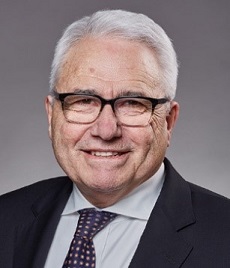
Mr. Raymond Théberge was appointed Commissioner of Official Languages on January 29, 2018.
He has held positions at the Collège universitaire de Saint-Boniface, Université Laval, and Université de Moncton. From 2004 to 2005, he was Assistant Deputy Minister at the Bureau de l’éducation française in Manitoba’s Department of Education, Citizenship and Youth. From 2005 to 2009, he was Executive Director of the Council of Ministers of Education of Canada, and then he was an Assistant Deputy Minister in Ontario’s Ministry of Education and Ministry of Training, Colleges and Universities.
Mr. Théberge has a PhD in linguistics from McGill University, a master’s degree in applied linguistics from the University of Ottawa, and a bachelor’s degree in history from the Collège universitaire de Saint-Boniface.
Context
Mandate
The Commissioner of Official Languages is an independent Agent of Parliament appointed under the Official Languages Act. The Act gives French and English equal status in the federal government, and is a keystone of official bilingualism in Canada.
The Commissioner of Official Languages:
- promotes and oversees the implementation of the Official Languages Act
- protects the language rights of Canadians and promotes linguistic duality and bilingualism across Canada
- supports the development of official language minority communities in Canada
Role of the President of the Treasury Board
The Treasury Board is responsible for the general direction and coordination of official languages regulations and policies related to:
- communications with and service to the public
- language of work in federal institutions
- equitable participation of English-speaking and French-speaking Canadians in the public service
Under the Act, the President is responsible for tabling an annual report on the status of official language programs related to the Treasury Board’s responsibilities outlined above.
Issues of note
In his 2018 to 2019 annual report, the Commissioner recommended that:
- the Prime Minister table a bill on modernizing the Official Languages Act by 2021
- the Prime Minister clarify official languages roles and responsibilities in the federal government before April 2020
- the government consult with official languages minority communities when entering into certain agreements
- the government develop an accountability framework by June 2020 that includes results assessment mechanisms for federal institutions that play a role in the official languages action plan
Contact information
Raymond Théberge
Commissioner of Official Languages
Office of the Commissioner of Official Languages
30 Victoria St
Gatineau QC K1A 0T8
Tel: 819-420-4875
Email: comm@clo-ocol.gc.ca -
Caroline Maynard, Information Commissioner of Canada

Ms. Caroline Maynard was appointed Information Commissioner on March 1, 2018, for a seven-year term.
Earlier in her career, she was Legal Counsel in the Office of the Judge Advocate General and the Royal Canadian Mounted Police External Review Committee. From January 2017 to March 2018, Ms. Maynard was the Interim Chairperson and Chief Executive Officer of the Military Grievances External Review Committee, after serving as Director General, Operations, and General Counsel in the organization for a number of years.
She has a Bachelor of Laws from the Université de Sherbrooke, and she has been a member of the Quebec Bar since 1994.
Context
Mandate
The Information Commissioner is an independent Agent of Parliament appointed under the Access to Information Act, Canada’s federal freedom of information legislation. The Act provides individuals with a right to access records under the control of government institutions, and (following changes to the Act in June 2019 with the passage of Bill C-58) requires a range of institutions to proactively publish specified information. The Information Commissioner has oversight over the request-based access to information process, but not over proactive publication.
The Information Commissioner:
- provides arms-length oversight of the federal government’s practices in respect of access to information requests, and works with institutions to ensure they meet their obligations with respect to requests made under the Act
- investigates complaints about the handling of requests under the Act
- provides information and advice to parliamentarians on matters related to access to information
Role of the President of the Treasury Board
The President has primary responsibility for the administration of the Access to Information Act across the federal government. As the designated Minister responsible for the majority of the Access to Information Act, the President’s responsibilities include:
- undertaking a review of the Act by June 21, 2020, and every five years afterwards and tabling a report before each House of Parliament
- establishing policies and directives to government institutions regarding the administration of the Act
- publishing an annual statistical report on the access to information program across government
Under the Act, the President is responsible for tabling an annual report on the status of official language programs related to the Treasury Board’s responsibilities outlined above.
Issues of note
Increased funding
In her 2018 to 2019 annual report, Ms. Maynard noted a need for increased permanent funding for her Office. Although Budget 2019 allocated an additional $3 million in 2019 to 2020 fiscal year to her Office to enable it to resolve a backlog of complaints and new complaints, Ms. Maynard is of the view that the current temporary funding measures are an inefficient approach to addressing the backlog.
In addition, the government made available funding of up to $5.1 million over 3 years (2019 to 2022) and $1.7 million ongoing to support the Information Commissioner in implementing the new order-making power and other changes made by Bill C-58.
Upcoming Review of the Access to Information Act
The Information Commissioner will wish to be engaged and to provide input into the review of the Act that must be undertaken by the President by June 21, 2020.
Contact information
Caroline Maynard
Information Commissioner of Canada
Office of the Information Commissioner of Canada
30 Victoria St
Gatineau QC K1A 1H3
Tel: 819-994-0002
Email: caroline.maynard@oic-ci.gc.ca -
Yves Giroux, Parliamentary Budget Officer

Mr. Yves Giroux was appointed Parliamentary Budget Officer on September 4, 2018.
Mr. Giroux entered the federal public service in 1995 and assumed progressively senior level positions after joining the executive ranks in 2003. From 2005 to 2011, he served as Director and Senior Chief, Social Policy Division at the Department of Finance. Mr. Giroux then joined the Privy Council Office, where he served as the Director of Operations, Liaison Secretariat for Macroeconomic Policy for four years. From 2015 to 2018, Mr. Giroux served as Assistant Commissioner and Chief Data Officer, Strategy and Integration Branch, with the Canada Revenue Agency.
Mr. Giroux is a graduate of the Université de Montreal, where he earned a Master’s degree and a Bachelor’s degree, both in Economics.
Context
Mandate
The Parliamentary Budget Officer is an independent Officer of Parliament whose role is to provide independent, authoritative, nonpartisan, financial and economic analysis to support Parliament and parliamentarians. The Parliamentary Budget Officer is appointed by the Governor-in-Council following consultations with certain persons specified in the Parliament of Canada Act and after approval by resolution of the Senate and House of Commons.
The Parliament of Canada Act authorizes the Parliamentary Budget Officer to prepare reports on, for example, a budget tabled by the government or the Estimates of the government for a fiscal year. The Parliamentary Budget Officer may also undertake research and analysis into those Estimates pursuant to a request from a relevant committee of the Senate or the House of Commons.
Role of the President of the Treasury Board
The President’s sole legislative responsibility with regard to the Parliamentary Budget Officer is to table, before the House of Commons, the Parliamentary Budget Officer’s annual Estimates along with the government’s Estimates.
Otherwise, the Treasury Board Secretariat interacts with the Parliamentary Budget Office primarily by responding to requests for information received from the Parliamentary Budget Officer. These requests typically relate to the Public Accounts and Estimates tabled by the President.
Issues of note
Estimates Reform
On a pilot basis for 2 years (2018 to 2019 and 2019 to 2020), the government made changes to the Estimates process to better align the Estimates with the Budget. In 2019 to 2020, this included allotting each voted budgetary measure in table A2.11 of the 2019 Federal Budget an individual vote within the specific department or agency’s Main Estimates. The Parliamentary Budget Officer has been supportive of the changes made to the 2019 to 2020 Main Estimates. Nonetheless, the Parliamentary Budget Officer has noted that these changes do not address the fact that measures included in the new votes will not yet have gone through the Treasury Board Submission process. As such, the Parliamentary Budget Officer has highlighted that Parliamentarians are being asked to vote on Budget measures that have not received the same internal scrutiny as items in other voted measures.
Contact information
Yves Giroux
Parliamentary Budget Officer
Office of the Parliamentary Budget Officer
99 Bank St, Suite 900
Ottawa ON K1A 0A9
Tel: 613-992-8026
Email: Yves.Giroux@parl.gc.ca -
Mario Dion, Conflict of Interest and Ethics Commissioner

Mr. Mario Dion was appointed Conflict of Interest and Ethics Commissioner on January 9, 2018.
Mr. Dion began his legal career in 1980 as a legal advisor at the then Ministry of the Solicitor General. In 1996, Mr. Dion joined the Privy Council Office as Deputy Clerk and Counsel, after working in the Department of Justice. In 2003, Mr. Dion was appointed Deputy Minister of Indian Residential Schools Resolution of Canada. He served as Commissioner of Public Sector Integrity from 2011 to 2014, and as Chairperson of the Immigration and Refugee Board of Canada from 2015 to 2018.
Mr. Dion has a law degree from the University of Ottawa.
Context
Mandate
The Conflict of Interest and Ethics Commissioner is an independent Officer of Parliament and is appointed under the Parliament of Canada Act.
The Conflict of Interest and Ethics Commissioner:
- administers the Conflict of Interest Code for Members of the House of Commons, which governs the ethical conduct of Members of Parliament
- administers the Conflict of Interest Act, which governs the ethical conduct of certain public office holders, such as ministers, ministerial staff, and deputy heads
Role of the President of the Treasury Board
The President of Treasury Board is responsible for the Conflict of Interest Act. Should the government decide to amend the Act, the President would be responsible for sponsoring any bills introduced in the House of Commons and tabling any required Government Response to the Standing Committee on Access to Information, Privacy and Ethics.
Issues of note
Commissioner’s interpretation of the Conflict of Interest Act
The Commissioner issues information notices that can have significant impacts on public office holders. For example, an information notice issued in fall 2018 stated that the word “entity” under the Act includes a “public sector entity”. This confirmed that the Act’s post-employment provisions for reporting public office holders (e.g. ministers, full-time ministerial staff and Governor in Council appointees) may restrict their ability to accept employment with certain public sector organizations after they leave public office, unless they obtain an exemption from the Commissioner.
Review of the Conflict of Interest Act
The Act required that a parliamentary committee conduct a review of the Act within five years of coming into force. This review was completed in 2014 by the Standing Committee on Access to Information, Privacy and Ethics. Although no further reviews of the Act are required by law, it is possible that the Act may be studied by a parliamentary committee in the future.
Contact information
Mario Dion
Conflict of Interest and Ethics Commissioner
Office of the Conflict of Interest and Ethics Commissioner
66 Slater St, 22nd Floor
Ottawa ON K1A 0A6 -
Provincial and Territorial Ministerial Counterparts
The following profiles include information on provincial and territorial Ministers with mandates most closely resembling that of the President of the Treasury Board.
There is some variability in the mandates of your Treasury Board colleagues at the provincial and territorial level. Currently, there is no dedicated venue for federal, provincial, and territorial leaders of Treasury Boards to gather and discuss issues of mutual interest.
Notable engagement with provincial and territorial counterparts is related to the President of the Treasury Board’s regulatory responsibilities. This occurs via multiple fora. The Committee on Internal Trade (CIT) is a ministerial federal-provincial/territorial committee which oversees the overall implementation of the Canadian Free Trade Agreement. In addition, this Agreement and the Regulatory Reconciliation Table (RCT) established mechanisms to address regulatory differences between Canadian jurisdictions to reduce inter-provincial barriers to trade, investment and labour mobility and to promote regulatory cooperation. The Honourable Geoff MacLellan, Minister of Trade, Nova Scotia, is the current Chair of the Committee on Internal Trade.
-
The Honourable Travis Toews, Minister of Finance, President of the Treasury Board, Alberta

The Honourable Travis Toews was elected to the Legislative Assembly of Alberta in April 2019, as the Member of Legislative Assembly for Grande Prairie-Wapiti, and appointed Minister of Finance and President of the Treasury Board.
Prior to this, Mr. Toews worked in a public accounting practice and has invested in and managed two businesses along with his wife. He has also served as a Director on a number of non-profit and industry boards (e.g. the Alberta Beef Producers and the Canadian Agri-Food Trade Alliance) and was President of the Canadian Cattlemen’s Association (2010 to 2012). Mr. Toews has been a Canadian representative on the Asia Pacific Economic Cooperation Committee on Food Security and a member of the Country of Origin Labelling Canadian World Trade Organization Legal Working Group.
Mr. Toews holds a Certified Public Accountant, Certified Management Accountant accounting designation.
Context
The Minister’s key portfolio responsibilities are the following:
- budget and planning
- cannabis legalization
- economic analysis and statistics
- expense disclosure
- information on insurance, pensions and financial institutions
- investor relations, banking and payment security
- provincial audit committee and internal audit services
- taxes and levies
- unclaimed property
Contact information
The Honourable Travis Toews
President of the Treasury Board and Minister of Finance
Executive Branch
208 Legislature Building
10800-97 Ave
Edmonton AB T5K 2B6
Tel: 780-415-4855
Email: tbf.minister@gov.ab.ca -
The Honourable Carole James, Deputy Premier, Minister of Finance, Chair of the Treasury Board Committee, British Columbia

The Honourable Carole James was sworn in as the Minister of Finance and Deputy Premier of the Province of British Columbia on July 2017. Ms. James was elected Leader of the British Columbia New Democrats in November 2003 and elected Member of the Legislative Assembly for Victoria-Beacon Hill in 2005. She served as Leader of the Official Opposition in British Columbia for seven years.
Previously, Ms. James served as the Director of Child and Family Services for Carrier Sekani Family Services in Prince George in 2001. She coordinated the planning for the regionalization of child and family services from the government to an Aboriginal Authority. Ms. James served as President of the British Columbia School Trustees Association for an unprecedented five terms, commencing in 1995. She was elected to the Greater Victoria School Board from 1990 to 2001. She has also served at the national level as the Vice-President of the Canadian School Boards Association. Ms. James has also sat on the Independent British Columbia Budget Review Panel, the Public Education Restructuring Consultation, and the Ministry of Children and Families Secure Care Committee.
Context
The Minister’s key portfolio responsibilities are the following:
- budget
- public sector collective bargaining
- economic analysis and statistics
- public sector planning and reporting
- crown Agencies and board resourcing
- legislative consultations
- tax system reform (including carbon tax)
- housing affordability
- funding partnerships for capital infrastructure projects
Contact information
The Honourable Carole James
Minister of Finance and Deputy Premier, Chair of the Treasury Board Committee
Parliament Buildings, Room 153
Victoria BC V8V 1X4
Tel: 250-387-3751
Email: FIN.Minister@gov.bc.ca -
The Honourable Scott Fielding, Minister of Finance, Minister Responsible for the Civil Service, Manitoba

The Honourable Scott Fielding was appointed Minister of Finance and Minister Responsible for the Civil Service in August 2018.
Mr. Fielding previously served as Minister of Families following his election as a member of the Manitoba Legislative Assembly for Kirkfield Park in April 2016. Prior to this, Mr. Fielding served on Winnipeg City Council as Chair of the Finance Committee and Chair of the Winnipeg Police Board from 2006 to 2016. Before his political career, Mr. Fielding was the owner of a small management consulting business and was an active member of the Assiniboia Chamber of Commerce.
He graduated from the University of Manitoba with an Advanced Bachelor of Arts degree in Economics and Political Studies.
Context
The Minister’s key portfolio responsibilities are the following:
- budget and planning
- accommodation services
- business transformation and technology
- comptrollership
- financial institutions regulation
- financial literacy
- taxation
- research and statistics
- pension Commission
- procurement services
- public Utilities Board
- Treasury Board Secretariat
Contact information
The Honourable Scott Fielding
Minister of Finance
Room 103, Legislative Building
450 Broadway
Winnipeg MB R3C 0V8
Tel: 204-945-3952
Email: minfin@leg.gov.mb.ca -
The Honourable Ernie Steeves, Minister of Finance, President of the Treasury Board, New Brunswick

The Honourable Ernie Steeves has served as Minister of Finance and President of the Treasury Board of New Brunswick since November 2018.
Mr. Steeves was first elected in September 2014 as the Progressive Conservative member of the Legislative Assembly representing Moncton Northwest. He served as critic for Social Development, Seniors and Long Term Care. He was also a Member of the Standing Committee on Public Accounts, the Standing Committee on Estimates and Fiscal Policy and the Standing Committee on Social Policy.
Prior to his political career, Mr. Steeves worked in radio broadcasting and owned a business in Moncton. He has served in a variety of community roles, including honorary chair for the Ride for Dad for prostate cancer. He has volunteered at the Karing Kitchen, Moncton Headstart, the Friends of the Moncton Hospital, and, as a cancer survivor, the Canadian Cancer Society.
Context
The Minister’s key portfolio responsibilities are the following:
- budget and planning
- capital investment
- financial management and regulation
- comptrollership
- human resources
- Office of the Chief Information Officer
- taxation
- research and statistics
- pensions
Contact information
The Honourable Ernie Steeves
Minister of Finance and President of the Treasury Board
Chancery Place
PO Box 6000
Fredericton NB E3B 5H1
Tel: 506-453-2451
Email: Ernie.Steeves@gnb.ca -
The Honourable Tom Osborne, Minister of Finance, President of the Treasury Board, Newfoundland and Labrador

The Honourable Tom Osborne has served as Minister of Finance and President of the Treasury Board of Newfoundland and Labradour since May 2019, previously serving in the same position from July 2017 to April 2019. Mr. Osborne is also the Minister Responsible for the Human Resource Secretariat, Minister Responsible for the Public Service Commission, Minister Responsible for the Office of the Chief Information Officer, and the Minister Responsible for the Newfoundland and Labrador Liquor Corporation. Since his election in 1996 to represent the district of Waterford Valley (formerly St. John's South), Mr. Osborne has served as Minister of Environment, Minister of Labour, Minister of Health, Minister of Justice and has served as Deputy Speaker and Speaker of the House of Assembly. Prior to entering politics, he worked for Statistics Canada, Small Business Enterprise, and the Penney Group of Companies.
Mr. Osborne studied at Cabot College and Memorial University of Newfoundland.
Context
The Minister’s key portfolio responsibilities are the following:
- budget and planning
- fiscal, financial, statistical and economic policy
- financial management and regulation
- treasury management
- comptrollership
- Cabinet committee support
- taxation
- pensions
Contact information
The Honourable Tom Osborne
Minister of Finance and President of the Treasury Board
Main Floor, East Block, Confederation Building
PO Box 8700
St. John's NL A1B 4J6
Tel: 709-729-4882
Email: tosborne@gov.nl.ca -
The Honourable Karen Lynn Casey, Deputy Premier, Minister of Finance and the Treasury Board, Nova Scotia

The Honourable Karen Lynn Casey was appointed Minister of Finance and the Treasury Board in June 2017. She also serves as Deputy Premier, Deputy President of the Executive Council, and Chair of Treasury and Policy Board.
From 2011 to 2017, she served as Minister responsible for Youth, Minister of Education and Early Childhood Development, and Chair of Treasury and Policy Board. Ms. Casey was first elected as a Progressive Conservative member to the House of Assembly in 2006 and served as Interim Leader of the Progressive Conservative Party from June 2009 to August 2010 as well as Minister of Education and Minister of Health.
Ms. Casey is a former Assistant Superintendent of the Chignecto-Central Regional School Board and a former principal.
Context
The Minister’s key portfolio responsibilities are the following:
- budget and planning
- government finances and financial health
- public accounts
- insurance industry regulation
- credit union and trust regulation
- utility and Review Board
- economic growth
- economics and statistics
- investor relations
Contact information
The Honourable Karen Lynn Casey
Department of Finance and Treasury Board
7th Floor, Provincial Building
1723 Hollis Street
PO Box 187
Halifax NS B3J 2N3
Tel: 902-424-5720
Email: FinanceMinister@novascotia.caNote: The Honourable Geoff MacLellan, Minister of Trade, Nova Scotia would be the key contact on regulatory matters. Mr. MacLellan’s profile and contact information can be found in the next profile.
-
The Honourable Geoff MacLellan, Minister of Trade, Nova Scotia

The Honourable Geoff MacLellan was first elected to the Nova Scotia House of Assembly in 2010 and was re-elected in 2013 and 2017.
He has served as Minister of Transportation and Infrastructure Renewal, Minister responsible for Sydney Tar Ponds Agency, and Minister of Energy.
He is the Government House Leader. Prior to being elected, Mr. MacLellan was a riding assistant for Rodger Cuzner and was the director of Business Development, the Maritime Environmental Training Institute in Sydney as well as the Cape Breton University Representative and the Program Coordinator for the Canadian International College in Cairo, Egypt.
He is a member of the Assembly Matters and Internal Affairs Committees. He is also a member of the House of Assembly Management Commission.
Context
The federal government works closely with the Nova Scotia Minister of Trade through the Committee on Internal Trade. The Committee on Internal Trade is a ministerial federal-provincial/territorial committee which oversees the overall implementation of the Canadian Free Trade Agreement. The current Chair of the Committee on Internal Trade is the Honourable Geoff MacLellan, but his term is set to expire on December 31, 2019. The Premier of Newfoundland and Labrador, Dwight Ball, is expected to assume the role of Chair of the Committee on Internal Trade in 2020. Most recently, the federal government was represented on the Committee on Internal Trade by the Minister of Intergovernmental Affairs and Northern Affairs and Internal Trade.
Contact information
The Honourable Geoff MacLellan
Minister of Trade
Department of Business
Centennial Building
1660 Hollis Street, Suite 600
PO Box 2311
Halifax NS B3J 3C8
Telephone: 902-424-0377
Email: TradeMinister@novascotia.ca -
The Honourable Peter Bethlenfalvy, President of the Treasury Board, Ontario

The Honourable Peter Bethlenfalvy was appointed President of the Treasury Board in June 2018.
Mr. Bethlenfalvy was elected as a Progressive Conservative Party member of the Provincial Parliament for Pickering-Uxbridge in 2018. Previously, he was Chief Investment and Risk Officer at C.S.T. Consultants. Mr. Bethlenfalvy was also Senior Vice President, Financial Regulations at Manulife Financial and President and Chief Operating Officer of TD Securities.
Mr. Bethlenfalvy holds both a Bachelor of Science and a Master of Business Administration from McGill University which included a year at the HEC School of Management in Paris, France, and a Master of Arts in Political Science from the University of Toronto.
Context
The Minister’s key portfolio responsibilities are the following:
- public sector accountability
- expenditure management and comptrollership
- government labour relations
- corporate policy and agency governance
- internal audit
- human resources policy
Contact information
The Honourable Peter Bethlenfalvy
Treasury Board Secretariat
Whitney Block, 4th Floor, Rm. 4320
99 Wellesley St. W
Toronto ON M7A 1W3
Tel: 416-327-2333
Email: peter.bethlenfalvy@pc.ola.org -
The Honourable Darlene Compton, Deputy Premier, Minister of Finance, Chairperson of the Treasury Board, and Minister Responsible for Status of Women, Prince Edward Island
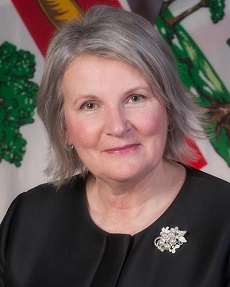
The Honourable Darlene Compton was appointed Minister of Finance and Chairperson of the Treasury Board in 2015. Ms. Compton is also Deputy Premier, the Minister Responsible for the Status of Women and sits on the Standing Committees of Legislative Management and Health and Wellness.
Ms. Compton was first elected as the Progressive Conservative Party Member of the Legislative Assembly for Belfast-Murray River in 2015. She has served as Opposition House Leader and Opposition Critic for Finance, Family and Human Services, and the Status of Women. She formerly sat on the Standing Committee of Public Accounts.
She sits on the board of the Belfast Development Corporation and the Belfast Recreation Centre and also serves as a Director of the Belfast Historical Society. Prior to being elected, Ms. Compton worked as administrator of the Dr. John Gillis Memorial Lodge.
Ms. Compton earned a business degree from Casco Bay College.
Context
The Minister’s key portfolio responsibilities are the following:
- public service management (finance, human resources, technology)
- Treasury Board support (policy and administrative)
- budget and Public Accounts
- expenditure management
- financial accountability
- cannabis legalization
- economics and statistics
- Interministerial Women’s Secretariat
- procurement
Contact information
The Honourable Darlene Compton
Minister of Finance and Chairperson of the Treasury Board
Shaw Building, 2nd Floor, South
95-105 Rochford Street
Charlottetown PE C1A 7N8
Tel: 902-368-4050
Email: MinisterFinance@gov.pe.ca -
The Honourable Christian Dubé, Minister of Government Administration and President of the Treasury Board, Quebec

The Honourable Christian Dubé has served as Minister of Government Administration and President of the Treasury Board since October 2018. He also serves as the Minister Responsible for the Montérégie Region, the Minister Responsible for Government Administration, and Member of the Comité ministériel des services aux citoyens.
Mr. Dubé was also the Member for the National Assembly for Lévis from 2012 to 2014.
Previously, Mr. Dubé served as senior vice-president at the Caisse de dépôt et placement du Québec and various senior positions such as Vice President at Cascades (2009 to 2012) and Senior Vice President and Chief Financial Officer at Domtar (1998 to 2004). He has held other positions at PriceWaterhouseCoopers and Lybrand. Mr. Dubé was also a member of the board of Cirque du Soleil and Bombardier Transport.
Context
The Minister’s key portfolio responsibilities are the following:
- public service management (finance, human resources, technology)
- expenditure management
- procurement
- public infrastructure
- information and statistics
- materiel management
- challenge function
Contact information
The Honourable Christian Dubé
Minister of Government Administration and President of the Treasury Board
Secrétariat du Conseil du trésor
875, Grande-Allée Est
4e étage, secteur 100
Québec QC G1R 5R8
Tel: 418-643-5926
Email: cabinet@sct.gouv.qc.ca -
The Honourable Donna Harpauer, Minister of Finance, Saskatchewan
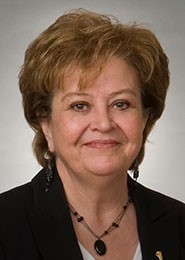
The Honourable Donna Harpauer was appointed Minister of Finance in August 2017.
Previously, Ms. Harpauer served as Minister of Government Relations and Minister Responsible for First Nations, Métis and Northern Affairs from August 2016 to August 2017. Ms. Harpauer was also appointed Minister of Social Services and Minister Responsible for the Saskatchewan Housing Corporation and Status of Women in June 2014. She served as Minister of Crown Investments from May 2012 to June 2014 and as Minister of Education from July 2010 to May 2012. Lastly, Ms. Harpauer served as the Minister of Social Services from November 2007 to June 2010.
Ms. Harpauer was first elected as a Saskatchewan Party Member of the Legislative Assembly in 1999. During her time in opposition, she served as the critic for Highways, Agriculture, Investment Saskatchewan, Crown Investments Corporation, SaskPower and SaskEnergy. She was also the Deputy Critic of Highways and Transportation and a member of the Legislature’s Board of Internal Economy.
Prior to entering politics, Ms. Harpauer worked in the microbiology lab at the Royal University Hospital.
Context
The Minister’s key portfolio responsibilities are the following:
- taxation
- expenditure management
- procurement
- public infrastructure
- information and statistics
- materiel management
- challenge function
Contact information
The Honourable Donna Harpauer
Minister of Finance
Legislative Building, Room 312
2405 Legislative Drive
Regina SK S4S 0B3
Tel: 306-787-6060
Email: fin.minister@gov.sk.ca -
The Honourable George Hickes, Minister of Finance, Nunavut

The Honourable George Hickes was appointed Minister of Finance in June 2018.
Mr. Hickes has also served as Minister of Health, Minister Responsible for Suicide Prevention, Minister for the Nunavut Housing Corporation and the Minister Responsible for the Qulliq Energy Corporation. Mr. Hickes was first elected in October 2013 and represents the constituency of Iqaluit-Tasiluk.
Prior to his election, Mr. Hickes held senior positions in the Government of Nunavut’s Department of Economic Development and Transportation, Department of Education, and the Qulliq Energy Corporation. Mr. Hickes also worked as Executive Assistant to the Minister of Education, in the banking industry, and owned his own small manufacturing business in Thompson, Manitoba.
Mr. Hickes has been a volunteer firefighter, a member of the Canadian Rangers and a youth hockey coach. He is married and has three children.
Context
The Minister’s key portfolio responsibilities are the following:
- budget
- financial advice to the Financial Management Board and Cabinet
- comptrollership (e.g., Financial Systems Management)
- reporting on government revenue and spending
- financial management policy
- human resources management policy (financial dimension)
- expenditure management
- Nunavut Liquor Commission
- internal audit services
Contact information
The Honourable George Hickes
Minister of Finance
PO Box 1000, Station 200
Iqualuit NU X0A 0H0
Tel: 867-975-5041
Email: ghickes@gov.nu.ca -
The Honourable Sandy Silver Premier, Minister of the Executive Office Council, and Minister of Finance, Yukon

The Honourable Sandy Silver was elected Premier of the Yukon in November 2016. Premier Silver also serves as the Minister responsible for the Executive Council (which includes Indigenous and intergovernmental relations) and Minister of Finance.
Premier Silver has led the Yukon Liberal Party since February 2014. He was first elected to the Yukon Legislative Assembly in the general election in October 2011.
Before his political career, Premier Silver led the mathematics department at Robert Service School in Dawson City. He also served as President of the Dawson City Music Festival, and volunteered for community organizations such as the Dawson City Fire Department and Learning Disabilities Association of Yukon. Premier Silver has also been an educator in the First Nations community where he supervised practicums for the Yukon Native Teachers Education Program and was involved with the Tr’ondëk Hwëch’in Justice department.
He holds degrees in math and psychology from Saint Francis Xavier University and a Bachelor of Education from the University of Maine.
Context
The Minister’s key portfolio responsibilities are the following:
- budget and planning
- accounting policy and financial management systems
- tax policy and programs
- intergovernmental relations
- Indigenous relations
- economic research, analysis, and reports
- ongoing services (e.g., cash management, payments)
- statistics bureau
- intergovernmental financial arrangements
Contact information
The Honourable Sandy Silver
Premier, Minister of the Executive Council Office and Finance
Box 2703
Whitehorse YK Y1A 1B2
Tel: 867-393-7142
Email: Sandy.Silver@gov.yk.ca -
The Honourable Caroline Wawzonek, Minister of Finance and Minister of Justice, Northwest Territories
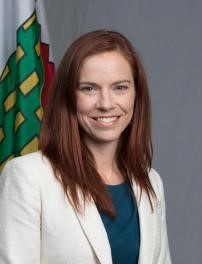
The Honourable Caroline Wawzonek was appointed Minister of Finance and Minister of Justice in November 2019.
For five years, Ms. Wawzonek ran a criminal law practice traveling to communities across the Northwest Territories (NWT). In 2013, she joined Dragon Toner Law Office and moved into general litigation. She worked with individuals, businesses, non-profits and governments to find solutions to legal and policy problems.
She has held executive positions at the Law Society NWT, NWT Montessori Society, NWT YWCA, NWT Chamber of Commerce and AVENS. She was also appointed to the Legal Aid Commission, the Income Support Appeal Committee and the City of Yellowknife’s Social Issues Committee. In 2017, Ms. Wawzonek was honored to be one of the recipients of a national award celebrating Canadian Women in Law.
Ms. Wawzonek’s paternal birth family are members of the Métis Nation of Alberta and her ancestry traces to Louis Riel and the founding of the Red River settlement.
Ms. Wawzonek has a Bachelor of Arts degree from the University of Calgary (2000) majoring in Law and Society with a minor in Mandarin and a law degree from the University of Toronto Faculty of Law (2005).
Context
The Minister’s key portfolio responsibilities as Minister of Finance are the following:
- negotiating major financial arrangements with the federal government
- Treasury Board support (policy and administrative)
- providing analysis and advice to the Financial Management Board
- ensuring that financial and information resources are managed effectively, efficiently and economically
- regulating the insurance industry and controlling the sale of alcohol products in the Northwest Territories
- recruiting and retaining a competent, representative public service
- developing programs and policies that effectively serve the human resource needs of the public service
- creating a work environment that promotes employee development, safety and wellness, and positive labour/management relations
Contact information
Honourable Caroline Wawzonek
Minister of Finance and Minister of Justice
P.O. Box 1320
Yellowknife, NT X1A2L9
Tel: (867) 767-9143 ext. [redacted] -
International Ministerial Counterparts
The following profiles include information on the President of the Treasury Board’s Ministerial counterparts from the United States, United Kingdom, New Zealand, Australia, and the Digital 9:
- Counterparts from the United Kingdom, New Zealand, and Australia are highlighted as they operate within Parliamentary systems and share many of the same responsibilities as the President of the Treasury Board, including comptrollership, public service management, expenditure management, human resources, performance measurement, procurement, management of the public service, and information technology.
- In addition, there are opportunities for bilateral engagement between the President of the Treasury Board and these counterparts (e.g. the Canada-Australia Public Policy Initiative and the Canada-United Kingdom Public Policy Forum).
- The United States Acting Director of the Office of Management and Budget is included because the role has responsibilities in common with those of the President of the Treasury Board. These include assessing funding requests; measuring the quality of programs, policies, and procedures; and overseeing the administration's procurement, financial management, information, and regulatory policies. In addition, they are the primary counterpart for the President of the Treasury Board on bilateral regulatory cooperation files.
- The former chair of the Digital 9 is included as the President of the Treasury Board assumed the role of Chair of the Digital 9 in November 2019.
Should the President of the Treasury Board wish to consult their counterparts on these or other issues, the profiles can be consulted to provide a starting point.
- Counterparts from the United Kingdom, New Zealand, and Australia are highlighted as they operate within Parliamentary systems and share many of the same responsibilities as the President of the Treasury Board, including comptrollership, public service management, expenditure management, human resources, performance measurement, procurement, management of the public service, and information technology.
-
Russell Vought, Acting Director of the Office of Management and Budget

Mr. Russell Vought is currently the Acting Director of the United States Office of Management and Budget (OMB). He was confirmed by the Senate as the Deputy Director in February 2018, and was promoted to Acting Director in January 2019 when Mick Mulvaney became Acting White House Chief of Staff.
Prior to this, Mr. Vought served for seven years as the Vice President of Heritage Action, which is the political wing of the conservative think tank the Heritage Foundation. He has also served as the Executive Director and Budget Director of the Republican Study Committee, as the Policy Director for the Republican Conference of the United States House of Representatives, and as a Legislative Assistant for U.S. Senator Phil Gramm (Texas).
Context
The Office of Management and Budget is the largest office within the Executive Office of the President of the United States. Its most prominent function is to produce the President’s Budget, but it also measures the quality of agency programs, policies, and procedures. It is the U.S. equivalent to the Treasury Board Secretariat.
The Office of Information and Regulatory Affairs is housed within the Office of Management and Budget. It oversees the implementation of regulatory policies and reviews regulations.
In 2011, the Prime Minister of Canada and the U.S. President announced the creation of the Canada-U.S. Regulatory Cooperation Council. Its goal is to align regulatory systems between the two countries to avoid unnecessary regulatory differences; generate benefits for regulated parties, consumers, and regulators; and boost North American trade nd competitiveness. The council has been a bilateral forum for resolving regulatory barriers and improving business investment between Canada and the U.S.
In June 2018, Canada and the U.S. negotiated a memorandum of understanding to strengthen the foundation for the ongoing work and growth of the Regulatory Cooperation Council. The signing of the memorandum was well-received by stakeholders.
Regulatory cooperation has been a key component of Canada’s efforts to improve its regulatory framework. The U.S. also considers regulatory cooperation to be an important tool in achieving their domestic regulatory agenda. Regulatory cooperation initiatives count as deregulatory actions under the U.S. two-for-one rule.
Contact information
Russell Vought
Acting Director of the Office of Management and Budget
The Office of Management and Budget
725 17th St NW
Washington DC 20503
United States of America
Tel: 202-395-3080 -
The Right Honourable Rishi Sunak, Chief Secretary to the Treasury, United Kingdom

The Right Honourable Rishi Sunak was appointed Chief Secretary to the Treasury in July 2019. He was previously Parliamentary Undersecretary of State at the Ministry of Housing, Communities and Local Government from January 2018 to July 2019.
Mr. Sunak was elected a Conservative Member of Parliament for Richmond (Yorks) in May 2015 and served as a Parliamentary Private Secretary at the Department for Business, Energy and Industrial Strategy from June 2017 until his ministerial appointment.
Before his political career, Mr. Sunak worked internationally in business and finance. He co-founded an investment firm working to help small and entrepreneurial British companies grow.
Mr. Sunak went to Winchester College and studied Politics, Philosophy and Economics at Oxford University. He was also a Fulbright Scholar at Stanford University (USA) where he studied for his Master of Business Administration.
Context
Her Majesty’s Treasury is the United Kingdom’s economic and finance ministry that maintains control over public spending, oversees the tax system, sets the direction for economic and infrastructure policy, and works to achieve economic growth. There are three Ministerial roles associated with the Treasury: the First Lord of the Treasury, the Chancellor of the Exchequer, and the Chief Secretary to the Treasury.
The Chief Secretary to the Treasury reports to the Chancellor of the Exchequer and is responsible for, among other things, annual spending reviews, public sector pay and pensions, efficiency and value for money in the public service, procurement, infrastructure spending, tax credits policy, and transport policy.
Unlike the Treasury Board Secretariat, the United Kingdom’s Treasury is not responsible for regulatory oversight. Instead, Canada engages regularly with the UK Ministry for Business, Enterprise, and Industrial Strategy on regulatory issues led the Right Honourable Andrea Leadsom, the Secretary of State for Business, Energy and Industrial Strategy.
Contact information
The Right Honourable Rishi Sunak
Chief Secretary to the Treasury
Her Majesty’s Treasury, The Correspondence and Enquiry Unit
1 Horse Guards Road
London SW1A 2HQ, UK
Tel: +020 7219 5437
Email: rishi.sunak.mp@parliament.uk -
The Honourable Mathias Cormann, Minister of Finance, Australia
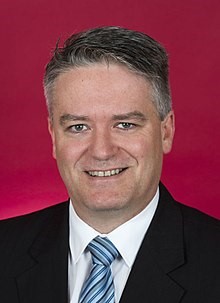
The Honourable Mathias Cormann was appointed Minister of Finance in August 2018. He also serves as Leader of the Government in the Senate since 2017 and as the Vice-President of the Executive Council.
Mr. Cormann was elected a Liberal Party Member of Parliament in 2007. Mr. Cormann previously served as Minister for the Public Service from 2018 to 2019, Special Minister of State from February to July 2016, Deputy Leader of the Government in the Senate in 2015, and Minister of Finance from 2013 to 2018. While in Opposition, he held the positions of Shadow Minister for Financial Services and Superannuation from 2010 to 2013, Shadow Minister for Employment Participation, Apprenticeships and Training from 2009 to 2010, and Shadow Assistant Treasurer, and Shadow Parliamentary Secretary for Health Administration from 2008 to 2009.
Prior to a career in politics, Mr. Cormann worked for major Western Australian health insurer HBF in a range of senior management roles between 2003 and 2007. He has also worked as a Ministerial Chief of Staff to Western Australian State Government Ministers, as Senior Adviser to then Western Australian Premier Richard Court and as an Adviser to then Justice and Customs Minister Chris Ellison. He also worked as an assistant to a Member of the European Parliament. At the age of 21, Mr. Cormann was elected a local councillor Raeren, Belgium.
Mr. Cormann was born in Belgium and migrated to Australia in 1994. He graduated with a degree in law at the Flemish University of Louvain (Leuven).
Context
Australia’s Minister of Finance is responsible for monitoring government expenditures and financial management, and shares many of the same management responsibilities of Canada’s President of the Treasury Board. In effect, the Minister of Finance serves as the deputy to the Treasurer (currently the Minister Frydenberg) as the Finance Minister acts as the Treasurer in the Treasurer's absence. Unlike the Treasurer, who by convention has been a member of the House of Representatives, the Finance Minister may come from either House of Parliament.
Canada and Australia participate in the Canada-Australia Public Policy Initiative, established in 2007 by the prime ministers of Canada and Australia to support learning opportunities on topics of mutual interest to both countries.
Contact information
The Honourable Matthias Cormann
Minister of Finance
Department of Finance
1 Canberra Ave
Forrest ACT 2603
Australia
Tel: +61 2 6215 2222 -
The Honourable Joshua Frydenberg, Treasurer, Australia

The Honourable Joshua Frydenberg was appointed Treasurer in August 2018. Mr. Frydenberg was elected as a Liberal Party Member of Parliament in August 2010.
Mr. Frydenberg previously served as Minister for the Environment and Energy, Minister for Resources, Energy and Northern Australia, Assistant Treasurer and Parliamentary Secretary to the Prime Minister from 2013 to 2018.
During his first term in Parliament, he was appointed to the Joint Committee of Public Accounts and Audit and the Joint Select Committee on Gambling Reform. He was a co-deputy chair of the Coalition’s Productivity Priorities Working Group, and a member of a committee established by Prime Minister Tony Abbott to advise him on the re-establishment of the Australian Building and Construction Commission. Prior to this, Mr. Frydenberg was a Senior Advisor to Foreign Minister Alexander Downer and Prime Minister John Howard and a Director of Global Banking at Deutsche Bank AG.
Mr. Frydenberg has Law and Economics degrees from Monash University. He went on to graduate with a Master’s in International Relations from Oxford University and a Master’s in Public Administration from Harvard University’s Kennedy School of Government.
Context
Australia’s Treasurer oversees the Department of the Treasury and is responsible for economic policy, fiscal policy, market regulation, and the federal budget. The Treasury is composed of 17 portfolio organizations, including the Australian Bureau of Statistics and the Australian Taxation Office.
Canada and Australia participate in the Canada-Australia Public Policy Initiative (CAPPI), which was established in 2007 by the prime ministers of Canada and Australia to support learning opportunities on topics of mutual interest to both countries.
Contact information
The Honourable Josh Frydenberg
Treasurer
Treasury of the Commonwealth of Australia
Australian Government, The Treasury
Langton Crescent
Parkes ACT 2600
Australia
Tel: +61 6263 2111
Email: department@treasury.gov.au -
The Honourable Grant Robertson, Minister of Finance, New Zealand

The Honourable Grant Robertson was appointed Minister of Finance, Minister for Sport and Recreation, and Associate Minister for Arts, Culture and Heritage in 2017. In June 2019, he was appointed Minister Responsible for the Earthquake Commission.
Mr. Robertson served as Deputy Leader of the Labour Party and Deputy Leader of the Opposition from 2011 to 2017. He was elected as a Labour Member of Parliament for Wellington Central in November 2008.
Prior to his political career, from 2005 to 2008, Mr. Robertson took a business development role with the University of Otago, working with researchers, investors and businesses to develop and commercialize the university’s world-leading research. From 2001 to 2005, he worked as an advisor to former Prime Minister Helen Clark. Mr. Robertson worked at the Ministry of Foreign Affairs and Trade from 1997 to 2001. He managed the New Zealand Overseas Aid Programme to Samoa and was posted to the United Nations in New York, where he worked on global environment and development issues.
Mr. Robertson studied politics at Otago University, and was the President of the Otago University Students’ Association and Co-President of the New Zealand University Students’ Association.
Context
New Zealand’s Minister of Finance is the head of the New Zealand Treasury and is responsible for producing the annual New Zealand budget outlining the government’s proposed expenditure. The Minister of Finance in New Zealand is the equivalent of the President of Treasury Board. The Treasury supports the Minister, by providing economic and financial advice.
Contact information
The Honourable Grant Robertson
Minister of Finance, Responsible Minister for the Treasury
The Treasury, New Zealand
1 The Terrace
Wellington 6011
New Zealand
Tel: +64 4 817 8703
Email: g.robertson@ministers.govt.nz -
Juan Andrés Roballo, Deputy Secretary of the Presidency, Uruguay (Former Chair of the Digital Nations)

His Excellency Minister Juan Andrés Roballo was appointed Deputy Secretary of the Presidency in 2015. He also serves as President of the National Drug Board. The Uruguayan general election was held on October 27, 2019. As no presidential candidate received a majority in the first round of voting, a runoff election will take place on November 24, 2019. A transition of the executive branch will follow spring 2020.
Prior to his current position, he served as Director of General Labor Inspection at the Ministry of Labor and Social Security from 2010 to 2014. Mr. Roballo holds a doctorate of social sciences and advocacy from the Universidad de la República.
Context
As Deputy Secretary to the President, Mr. Roballo is the Minister Responsible for the Digital Nations. In 2019, Uruguay served as the Chair of the Digital Nations and hosted the 6th Ministerial Summit in Montevideo, Uruguay in November 4 to 7, 2019. Following the Summit, Canada took over as Chair for one year and will be responsible for steering the group and hosting the 7th Ministerial Summit.
The Digital Nations provides a forum for the nine country participants to exchange information and best practices, collaborate on common goals and identify opportunities to use digital technology to create more effective and responsive digital governments. The group is guided by a non-binding Charter, first adopted by consensus at the group’s foundation in 2014. As of November 2019, member countries include Canada, Denmark, Estonia, Israel, Mexico, New Zealand, Portugal, South Korea, the United Kingdom, and Uruguay.
Canada joined the Digital Nations in February 2018 at the Ministerial Summit in Wellington, New Zealand. The group established a Secretariat in November 2018, which Canada agreed to support financially during a period of 12 to 24 months starting in 2018. Canada participates in the thematic groups on artificial intelligence, digital identity, and data 360.
Digital Nations members are also members of the Open Government Partnership, for which Canada served as the 2018 to 2019 Government Chair of the Open Government Partnership Steering Committee.
Contact information
His Excellency Juan Andrés Roballo
Torre Ejecutiva, Plaza Independencia 710
Uruguay
Email: falta@presidencia.gub.uy